Washington Documents
Quitclaim Deed
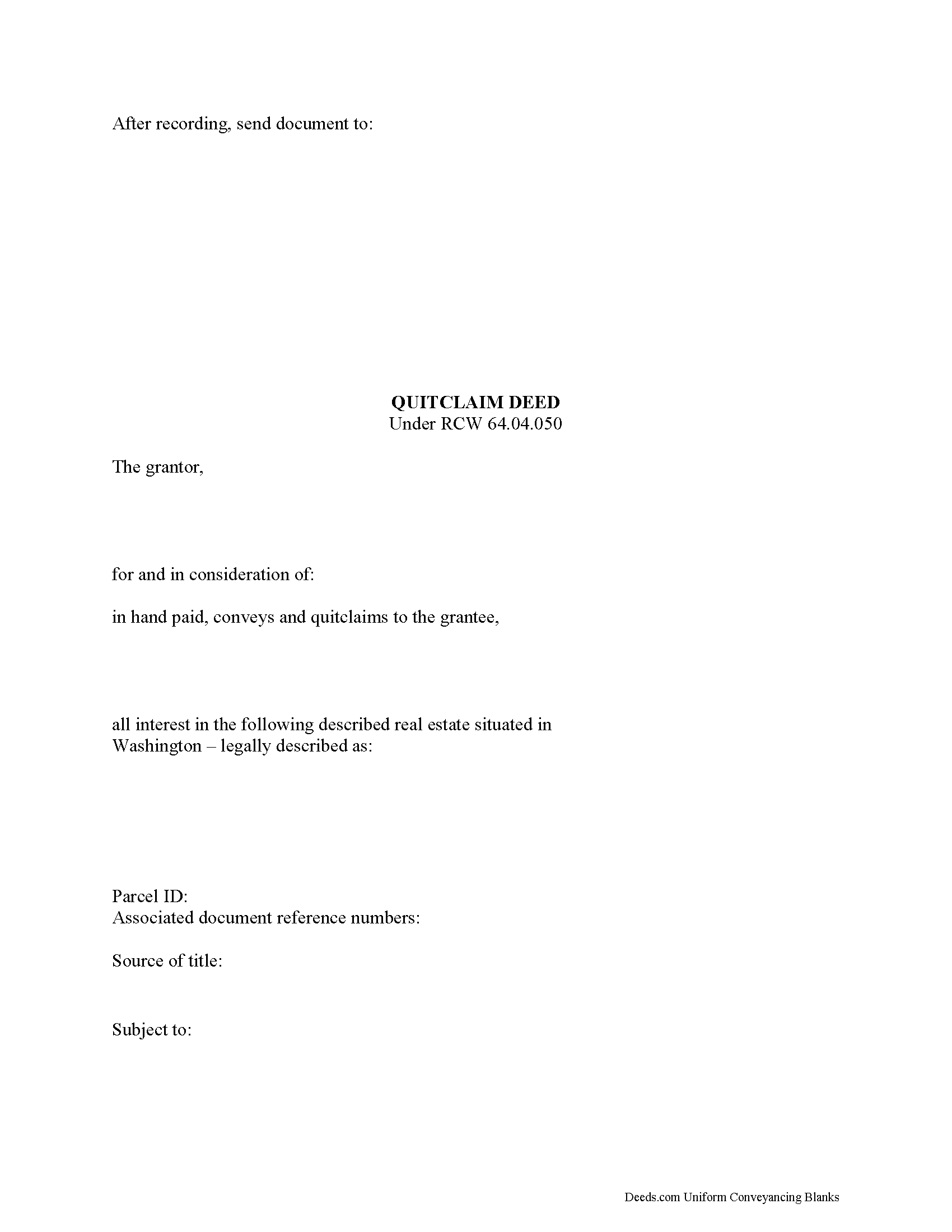
When presenting a quitclaim deed to the county auditor in the state of Washington, it is required to be in writing, signed by the parties bound to it, and acknowledged by a person who is authorized to take acknowledgments. Additional formatting requirements will apply to a quitclaim deed. If a quitclaim deed that relates to community or separate property includes a description of real estate that is described by lot and block or addition or plat, it will not be admitted to record until the plat of such an addition has been made a matter of record (RCW 65.04.30).
In order for a quitclaim deed to be valid against a later buyer who purchases the same property in good faith and for a valuable consideration, it must be recorded with the county auditor in the county where the property is situated. The priority of a quitclaim deed is determined by the order of recording. In the state of Washington, the moment a quitclaim deed is filed for record, it is considered recorded.
(Washington QD Package includes form, guidelines, and completed example)... More Information about the Washington Quitclaim Deed
Gift Deed
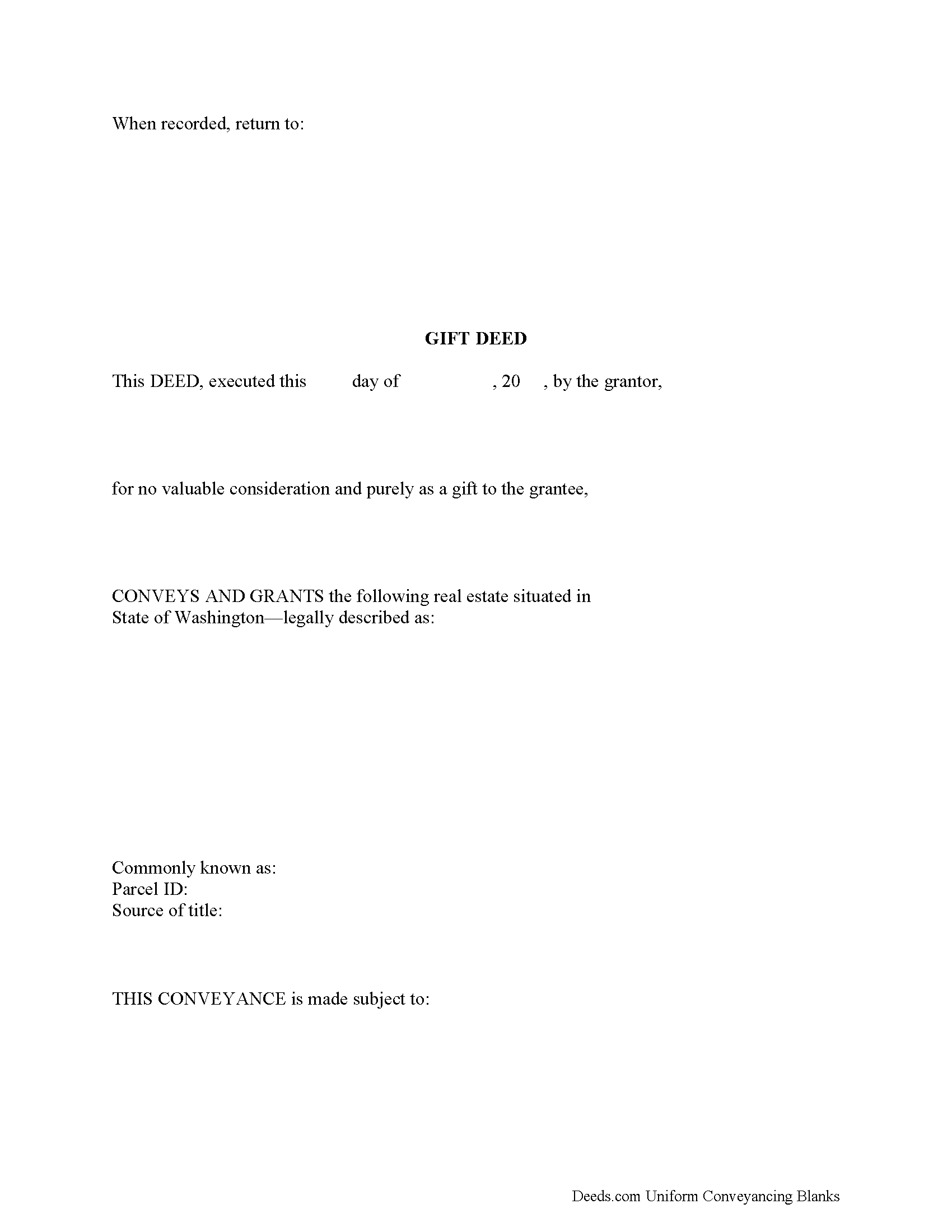
Gifts of Real Estate (Real Property) in Washington
A gift deed, or deed of gift, is a legal document voluntarily transferring title to real property from one party (the grantor or donor) to another (the grantee or donee). A gift deed typically transfers real property between family or close friends. Gift deeds are also used to donate to a non-profit organization or charity. The deed serves as proof that the transfer is indeed a gift and without consideration (any conditions or form of compensation).
In order for a gift deed to be valid they must meet the following requirements: The grantor must intend to make a present gift of the property, the grantor must deliver the property to the grantee, and the grantee must accept the gift. A gift deed must contain language that explicitly states no consideration is expected or required, because any ambiguity or reference to consideration can make the deed contestable in court. A promise to transfer ownership in the future is not a gift, and any deed that does not immediately transfer the interest in the property, or meet any of the aforementioned requirements, can be revoked [1].
A lawful gift deed includes the grantor's full name... More Information about the Washington Gift Deed
Warranty Deed
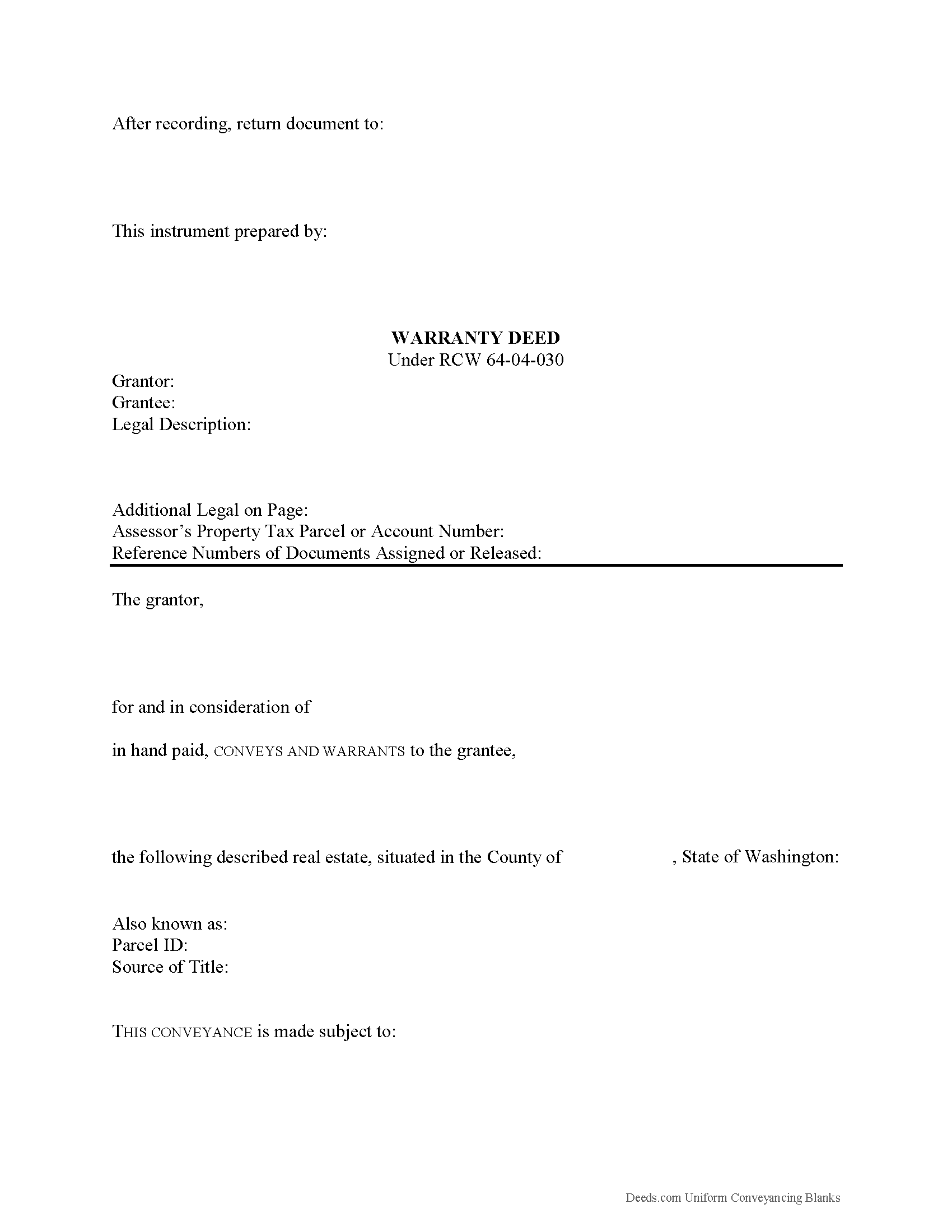
In Washington State, title to real property can be transferred from one party to another using a warranty deed. When recorded, a warranty deed conveys an interest in real property to the named grantee with full warranties of title.
A warranty deed contains the phrase "conveys and warrants" and offers the most assurance of title. It conveys real property in fee simple to the grantee and contains implied covenants by the grantor that he or she holds title to the property and has "good right and full power to convey the same"; that the property is "free from all encumbrances"; and that he warrants "the quiet and peaceable possession" of the property and "will defend the title thereto against all persons who may lawfully claim the same" (RCW 64-04-030).This assurance offers greater protection to the grantee than a special warranty deed, which guarantees the title only against claims that arose during the time the grantor held title to the property, or a quitclaim deed, which offers no warranties of title.
In addition to meeting all state and local standards for recorded documents, a lawful warranty deed includes the grantor's full name, mailing address, and marital status, the c... More Information about the Washington Warranty Deed
Bargain and Sale Deed
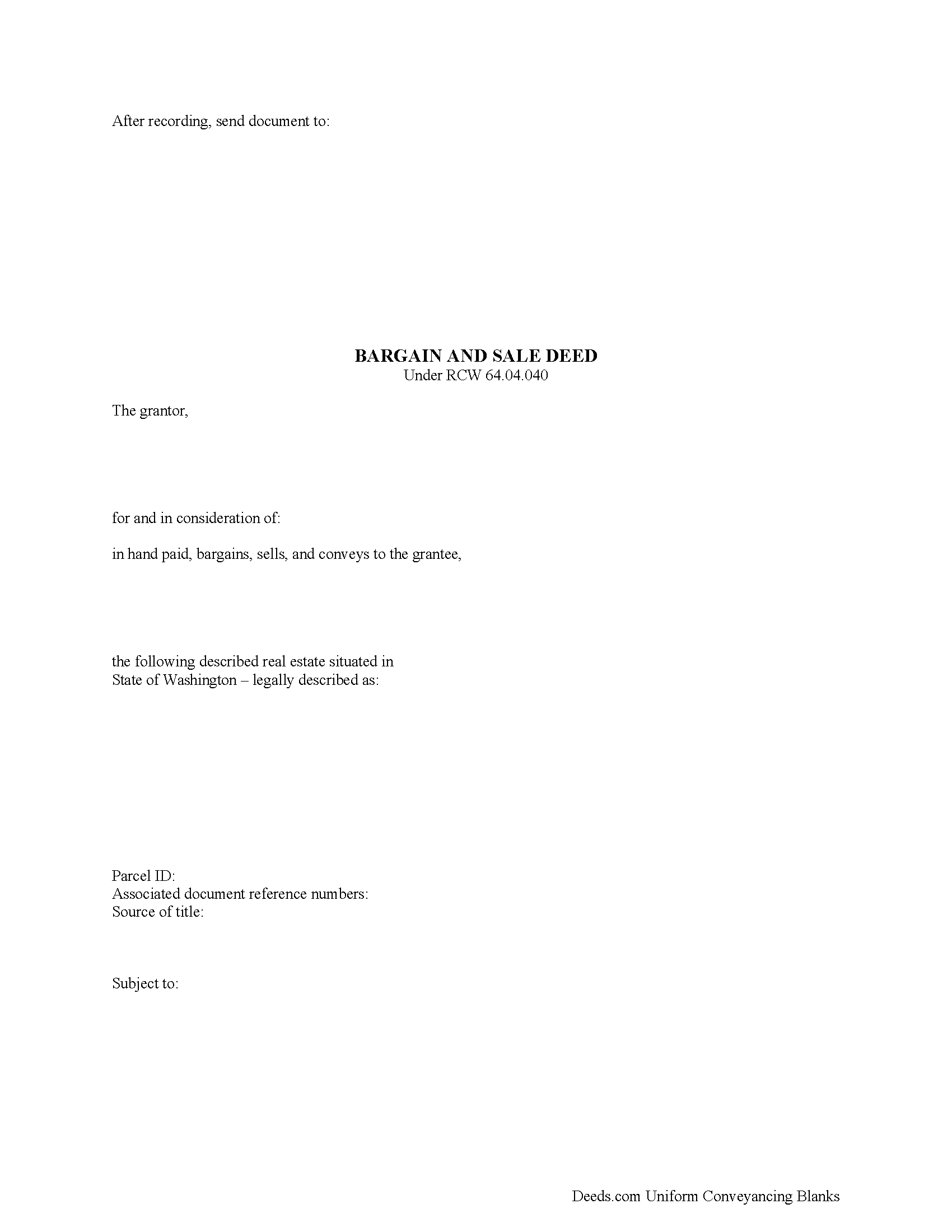
A bargain and sale deed is a conveyance of property rights wherein the grantor (owner) guarantees to the grantee (buyer) that during the time the grantor owned the real estate, he/she did nothing to cloud the title to the property.
In Washington, statutory bargain and sale deeds are governed by RCW 64.04.040. The statute defines the covenant to the grantee this way: "the grantor was seized of an indefeasible estate in fee simple, free from encumbrances, done or suffered from the grantor, except the rents and services that may be reserved, and also for quiet enjoyment against the grantor, his heirs and assigns, unless limited by express words contained in such deed; and the grantee, his heirs, executors, administrators and assigns may recover in any action for breaches as if such covenants were expressly inserted."
As with other deeds in Washington, record an executed bargain and sale deed at the recorder's office located in the same county as the land. Recording is the essential final step in land sales -- presenting the deed for entry into the public record keeps the property's chain of title updated and provides notice to any potential buyers about the change in ownership.... More Information about the Washington Bargain and Sale Deed
Special Warranty Deed
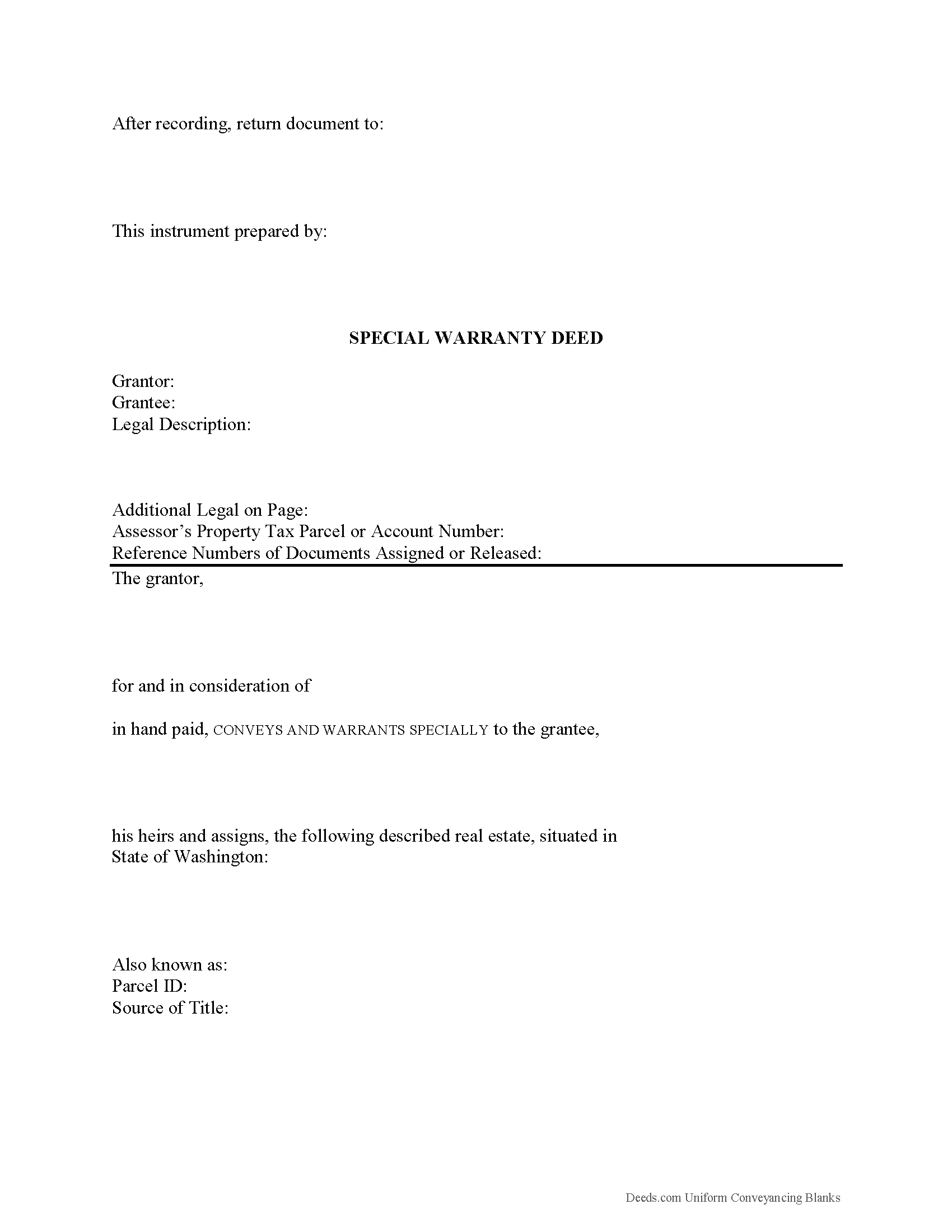
In Washington State, title to real property can be transferred from one party to another using a special warranty deed. When recorded, a special warranty deed conveys an interest in real property to the named grantee with limited warranties of title.
Special warranty deeds convey real property in fee simple to the grantee typically with the covenants from the grantor that the property is free from encumbrances made by the grantor and that the grantor will defend the grantee's title against any lawful claim arising by, through, or under the grantor, but none other. This means that the deed will not protect the grantee against title issues that arose prior to the time the grantor acquired title. A special warranty deed is recognizable by the terms "convey and warrant specially."
In addition to meeting all state and local standards for recorded documents, a lawful special warranty deed includes the grantor's full name, mailing address, and marital status, the consideration given for the transfer, and the grantee's full name, marital status, vesting, and mailing address. Vesting describes how the grantee holds title to the property. Generally, real property is owned in either so... More Information about the Washington Special Warranty Deed
Grant Deed
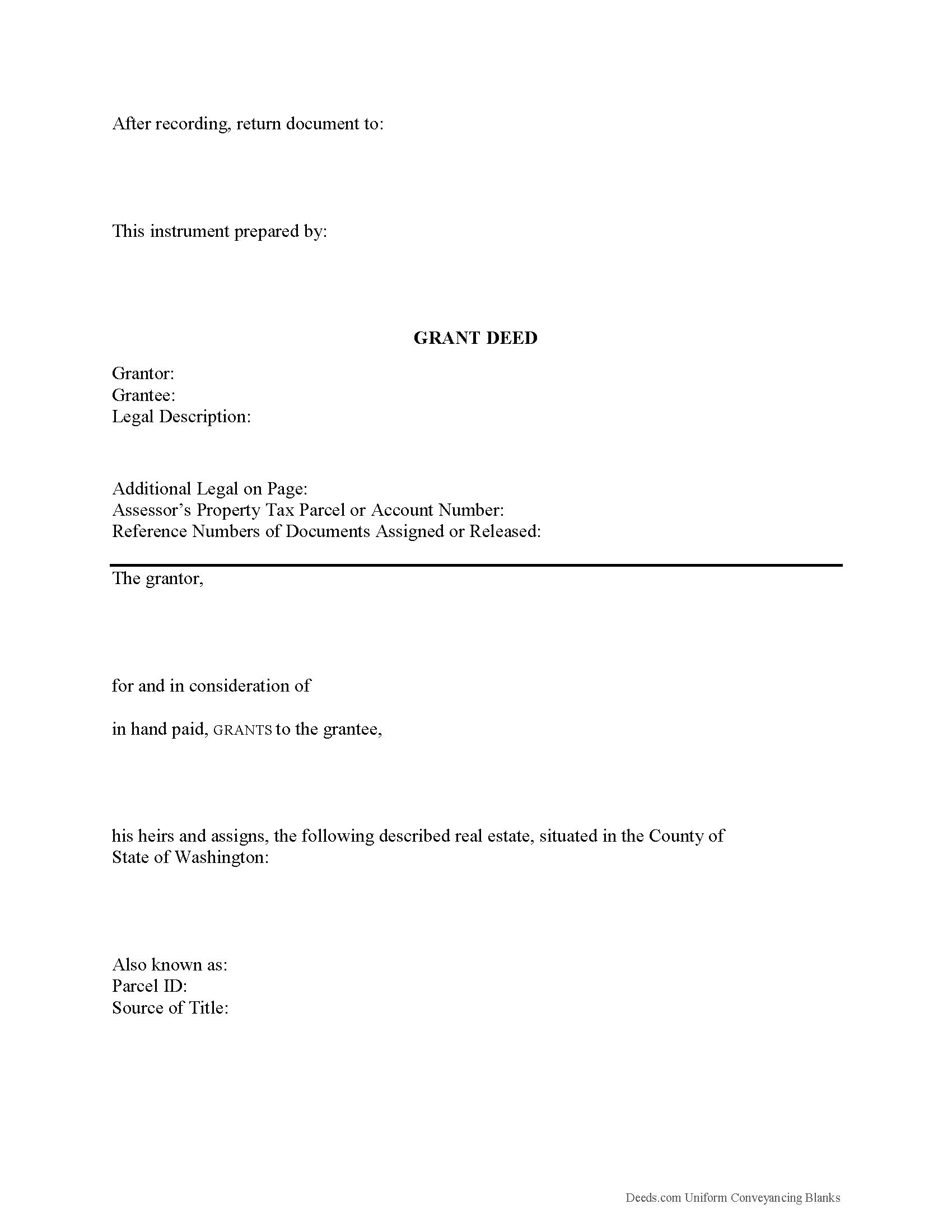
In Washington State, title to real property can be transferred from one party to another using a grant deed. Use a grant deed to transfer title with assurances that the grantor has not previously conveyed the estate and that he or she has not encumbered the property, except for any restrictions noted in the deed. The word "grant" typically signifies a grant deed, but it is not a statutory form in Washington.
Grant deeds offer the buyers (grantees) more protection than quitclaim deeds, but less than warranty deeds. A grant deed differs from a quitclaim deed in that the latter offers no warranty of title, and only conveys an interest that the grantor may have in the subject estate. Grant deeds, on the other hand, contain the implicit assurance that the grantor has actual rights to the title, as well as the authority to transfer those rights to someone else.
In addition to meeting all state and local standards for recorded documents, lawful grant deeds include the grantor's full name, mailing address, and marital status, the consideration given for the transfer, and the grantee's full name, mailing address, marital status, and vesting. Vesting describes how the grantee holds t... More Information about the Washington Grant Deed
Correction Deed
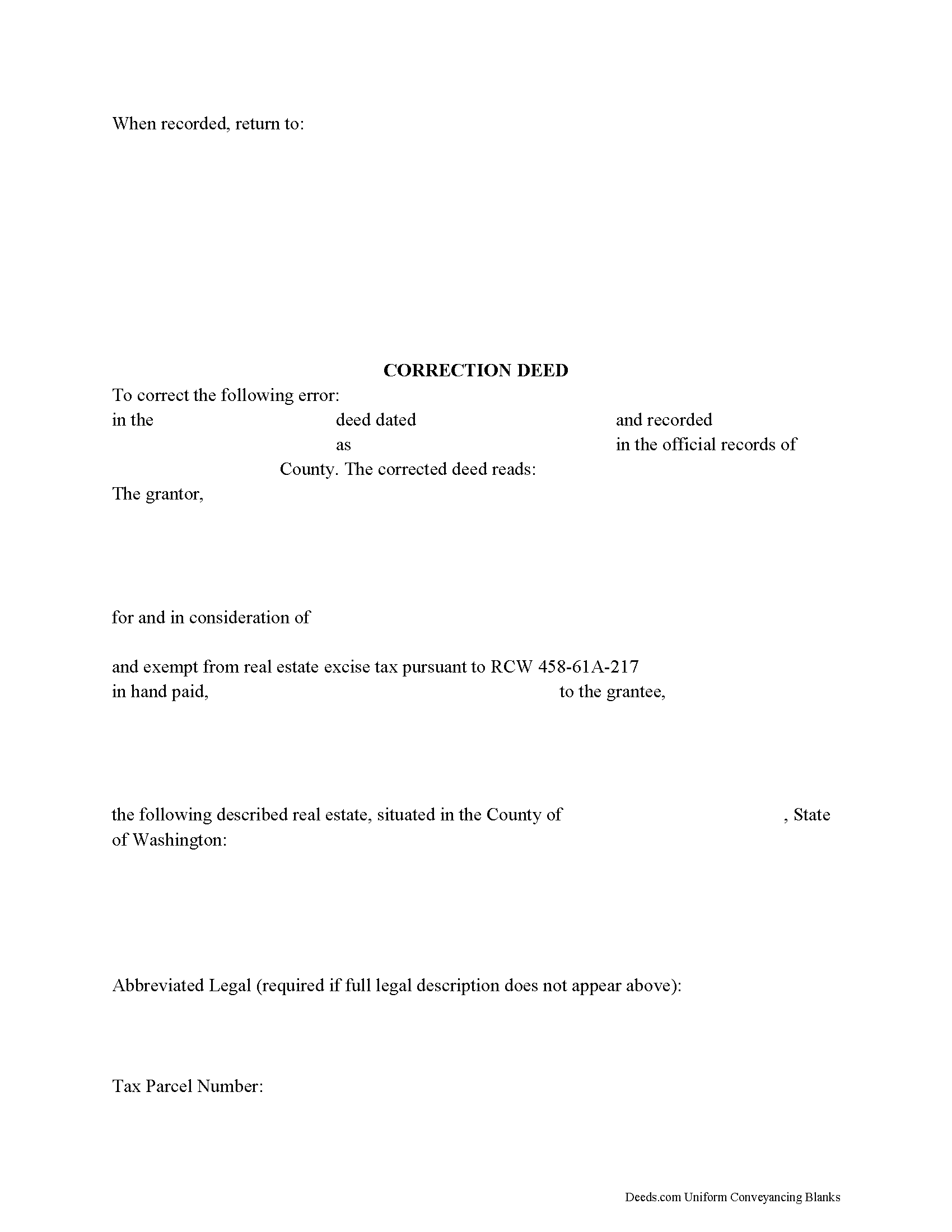
Use the corrective deed to correct an error in a previously recorded bargain and sale, warranty, or quitclaim deed in Washington State.
Once a deed has been recorded, it cannot be changed and remains part of the public record. It is possible, however, to amend that record by adding a newly executed deed. The method used depends upon the reasons for changing. For corrections of minor errors or omissions, a new correction deed or re-recording of the original deed will suffice. For larger errors or to include/omit a name from the existing deed, a standard conveyance, such as a warranty or quitclaim deed, may be more appropriate.
When re-recording the existing deed, use a cover sheet to reference the prior recording number, the reason for re-recording and the corrected information. The cover sheet, which is often provided by the county, must contain the following information: return address, document title or titles, reference numbers to other documents (here: the prior deed), names of grantors and grantees, entire or abbreviated legal description, assessor's property tax parcel number or account number.
A cleaner option for amending an error is the correction deed, especial... More Information about the Washington Correction Deed
Easement Deed
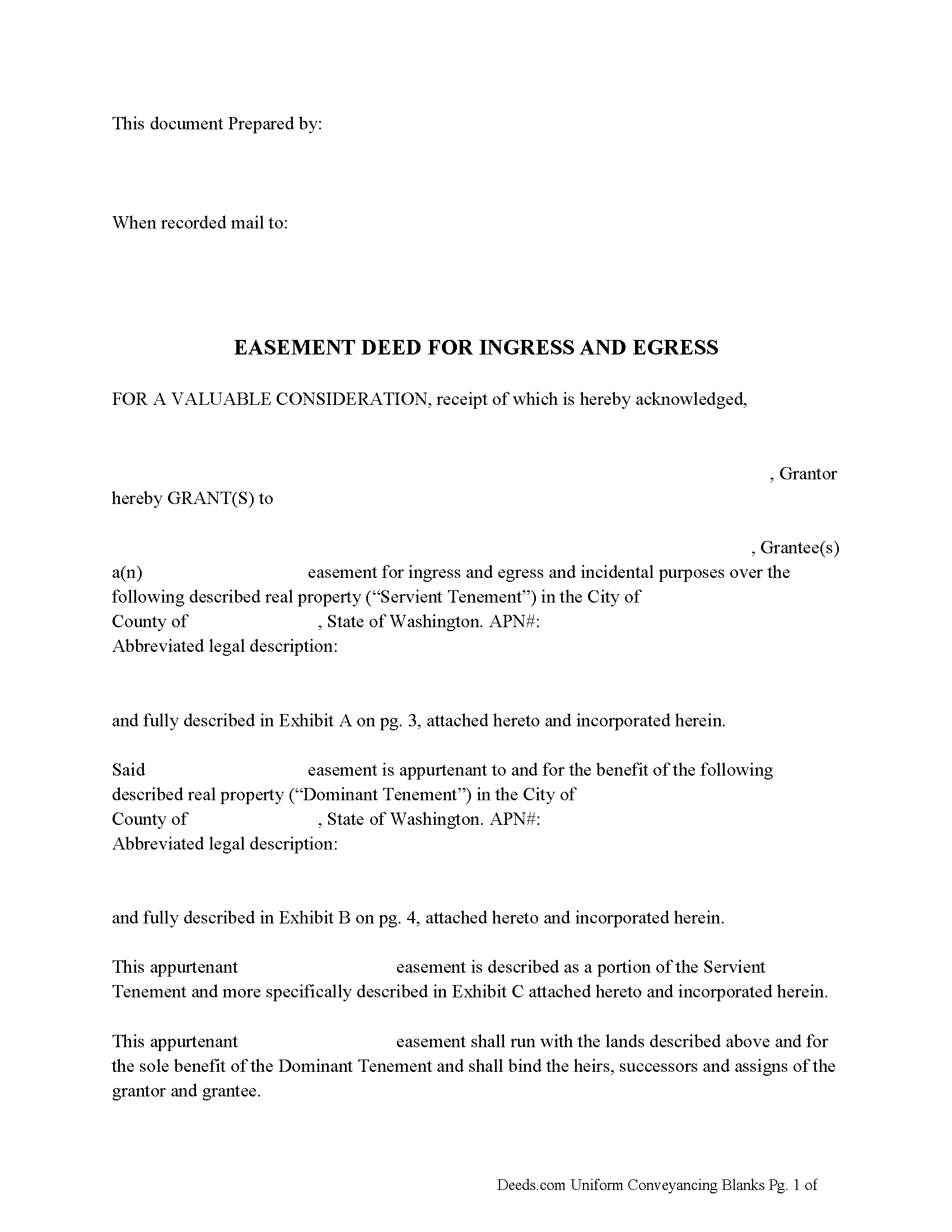
Easements are created to allow one person to use another's real property for a specific purpose. An easement in this state can be established by a deed in writing, by implication, or by prescription. Easements established by dedication are property rights that cannot be extinguished or altered without the approval of the easement owner, unless the plat or other document creating the dedicated easement provides for an alternative method to extinguish or alter the easement (RCW 64.04.175). Solar easements for assuring continued access to direct sunlight for solar energy systems can be created in this state and privately negotiated (RCW 64.04.140). A solar easement can only be created by written agreement, but is not authorized to be created by an implied or prescriptive easement (RCW 64.04.160). An easement deed in Washington should specify the terms, duration, and location of the easement.
To entitle an easement deed to be recorded in this state, it must be signed and acknowledged by the grantor. An easement deed can be acknowledged in this state before a justice or clerk of the Supreme Court, a judge or clerk of the court of appeals, a judge of the superior court or a qualified... More Information about the Washington Easement Deed
Termination of Easement
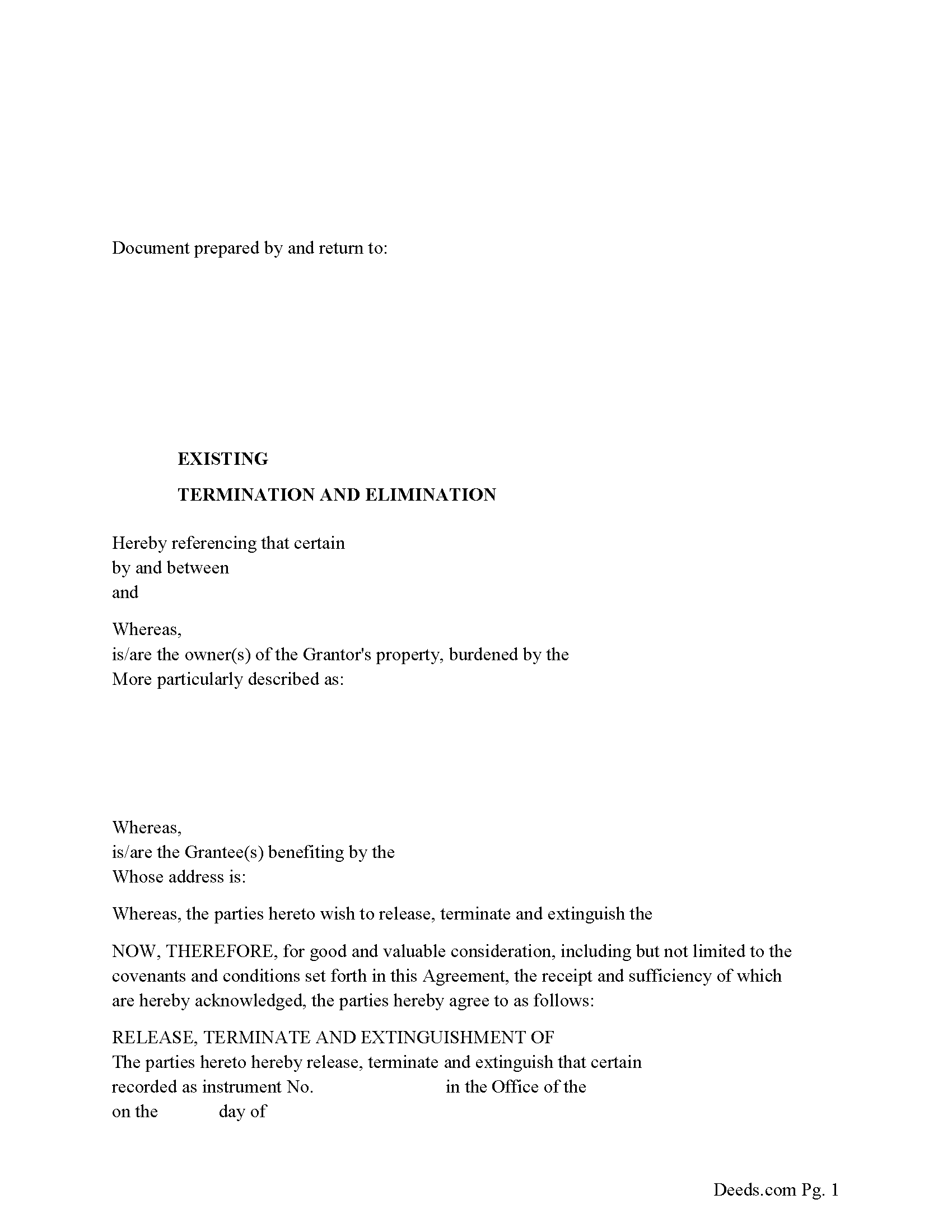
Use this form to release, terminate, extinguish a previously recorded document that involves access to and from a property.
Documents such as:
1. Easement Deeds or Agreements (An easement is a non-possessory interest in land, granting the right to use someone else's property for a specific purpose, like a driveway or utility line)
2. Access Roads
3. Right of Ways
4. Utility Easements (Power, Gas, Water, Sewer, Etc.)
5. Drainage Easements
This document allows the owner of the land, burdened by the access and the party that benefits from the access, to sign an agreement releasing the property from such access, ... More Information about the Washington Termination of Easement
Transfer on Death Deed
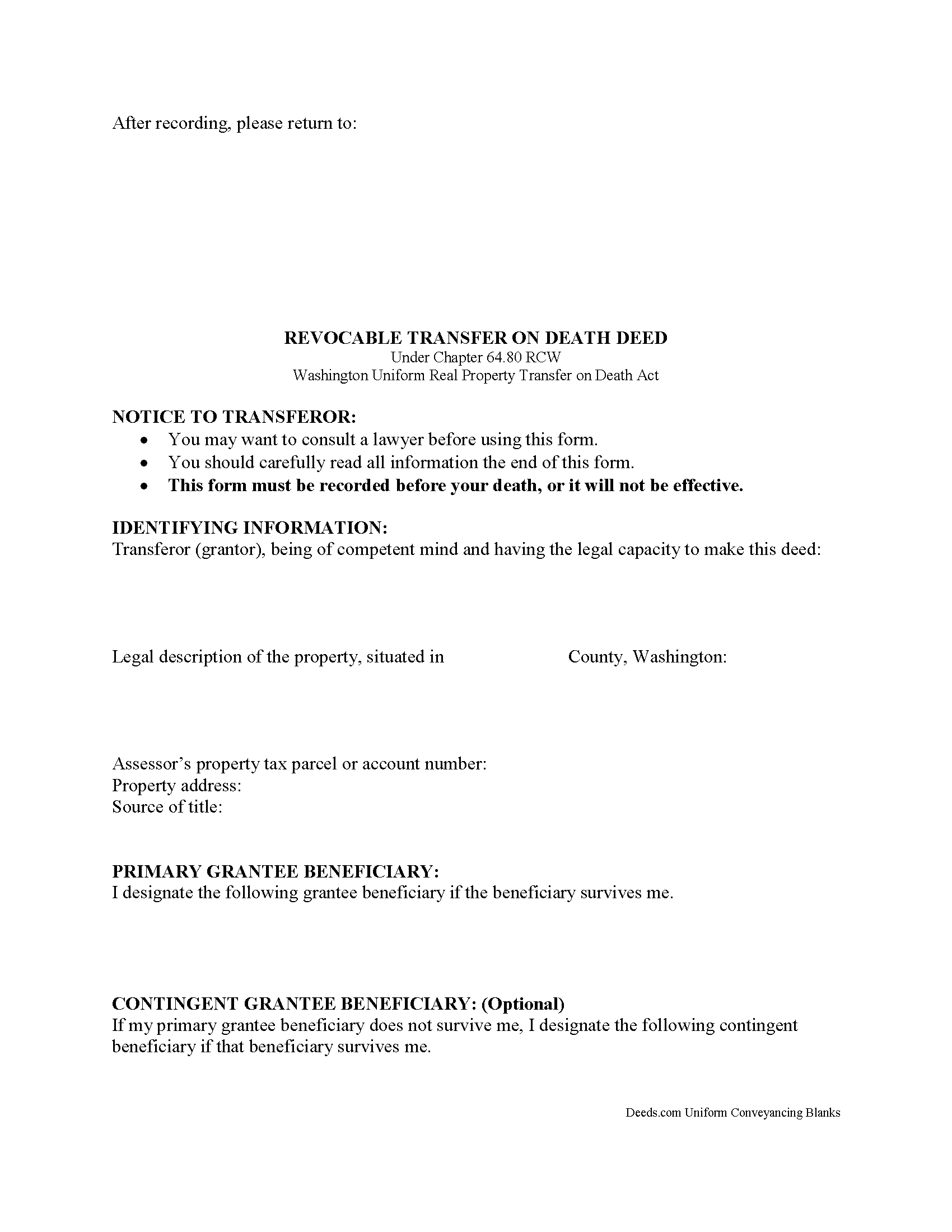
Real estate owners in Washington have an estate planning option: the transfer on death deed (TODD). Find the full text in the Revised Statutes of Washington at Chapter 64.80.
This statute is based on the Uniform Real Property Transfer on Death Act (URPTODA). Along with Washington, a growing number of states are choosing to adopt the provisions of the URPTODA. The new law allows landowners to direct the distribution of what is often their most significant asset, their real estate, with a correctly executed and recorded transfer on death deed.
Transfer on death deeds are nontestamentary, which means ownership of the property passes to the beneficiary without instructions in a will or the need for probate (64.80.040). Unnecessary conflicts are likely to add confusion and expense, so best practices dictate that landholders should take care to ensure that their wills and TODDs lead to the same outcomes.
Washington's version of the URPTODA sets out the specific requirements for lawful transfer on death deeds:
- The capacity required to make or revoke a transfer on death deed is the same as the capacity required to make a will (64.80.050, 11.12.010).
- It must contain the ... More Information about the Washington Transfer on Death Deed
Transfer on Death Revocation
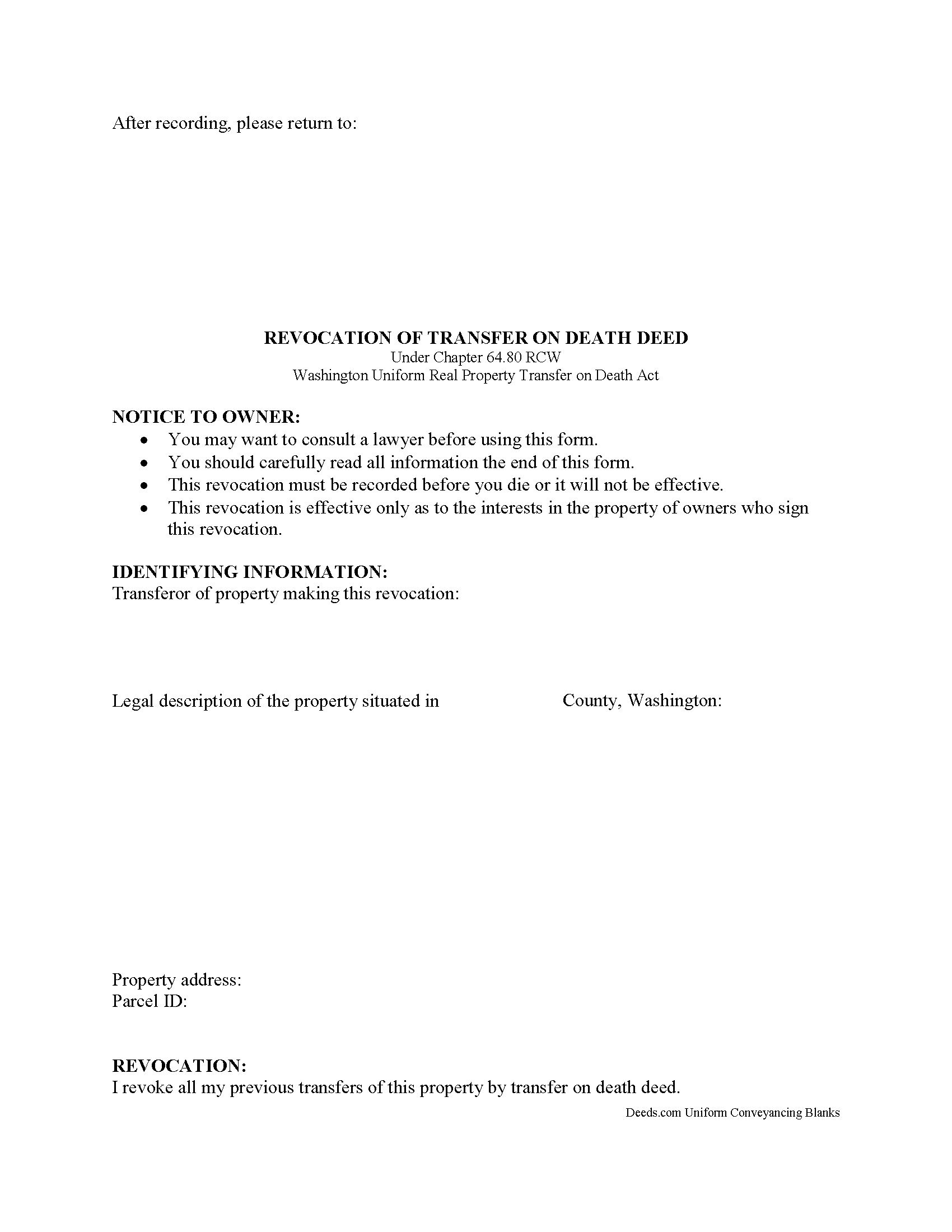
Revoking a Transfer on Death Deed in Washington
Earlier this year, the Washington legislature voted to join with an increasing number of states and adopt the Uniform Real Property Transfer on Death Act (URPTODA). The law is found at Chapter 64 of the Revised Code of Washington, and went into effect on June 12, 2014. This act allows owners of real property in the state to control the distribution of what is often their most significant asset, their real estate, by executing and recording a transfer on death deed (TODD).
Revocation is an important feature of transfer on death deeds because it allows the owner/transferor to easily respond to a change in circumstances. This option explains why TODDs do not require consideration or notice (64.80.070). At 64.80.080, the statute outlines the three methods available for changing or revoking a recorded transfer on death deed, by executing and recording:
- a new TODD
- a revocation form
- a deed (example: warranty deed) that conveys title to someone else and expressly revokes all or part of the TODD
To preserve a clear chain of title, it makes sense to file a revocation form when changing a previously recorded transfer on d... More Information about the Washington Transfer on Death Revocation
Transfer on Death Affidavit
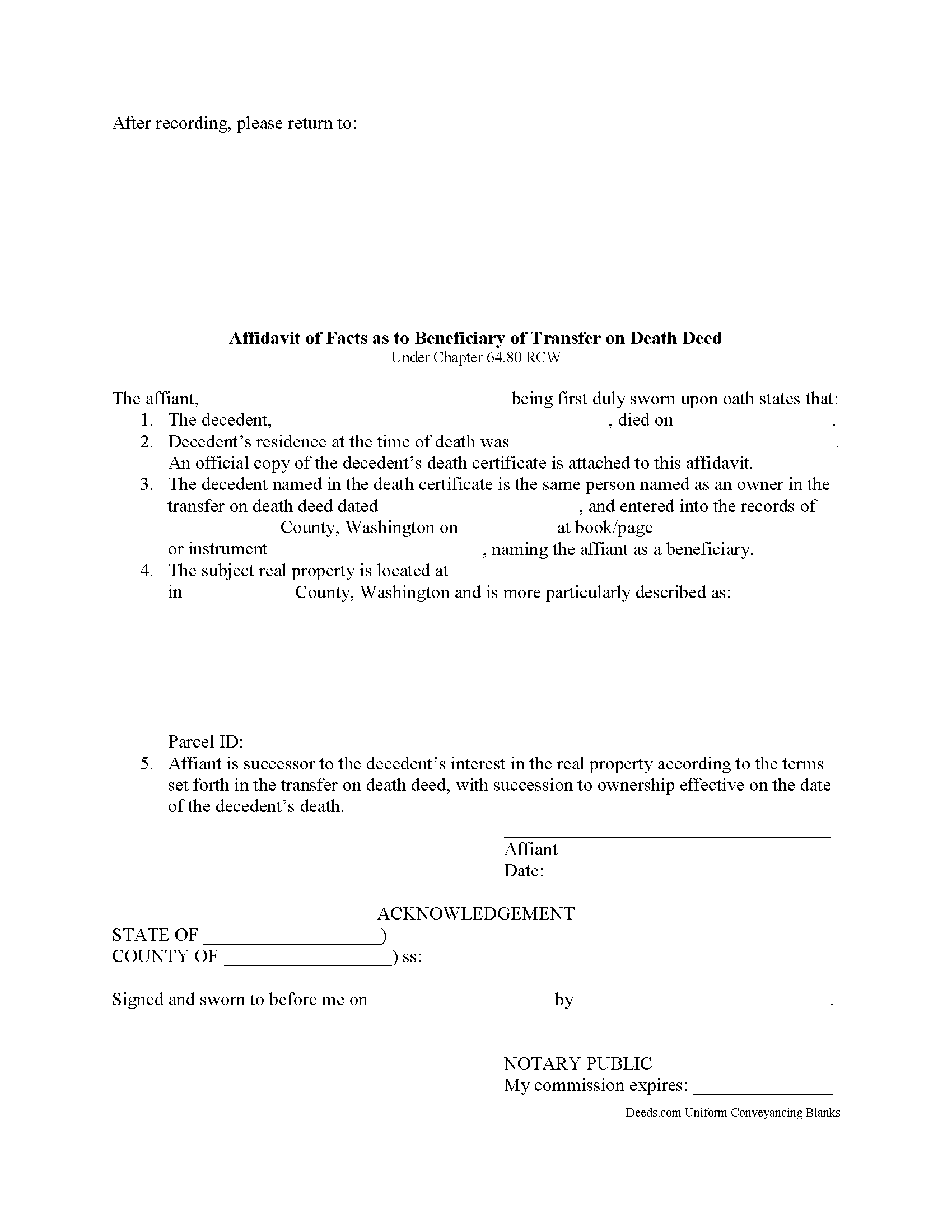
Transferring a Washington Real Estate Title to a Transfer on Death Beneficiary
The Revised Statutes of Washington set out the rules for transfer on death deeds at Chapter 64.80. Property transferred in this way is not passed in a will; instead, the named beneficiary's share is conveyed as a function of law, but not until after the property owner dies.
To perfect the title, RCW 82.45.197(7) discusses recording a certified copy of the owner's death certificate. Otherwise, the deceased owner's name would remain on the title. This inaccuracy can create confusion during a title search and slow down the transfer process. In addition, outdated information might interfere with property tax billing, possibly leading to fees and/or penalties.
By executing and recording an affidavit of facts as to death to accompany the death certificate the beneficiary can clarify the intended outcome of the transfer. This action keeps property records up-to-date, verifies interests and rights to the title, and ensures smoother transfers in the future.
Each circumstance is unique, so please contact an attorney with questions or for complex situations.
(Washington TODA Package includes form, ... More Information about the Washington Transfer on Death Affidavit
Personal Representative Deed
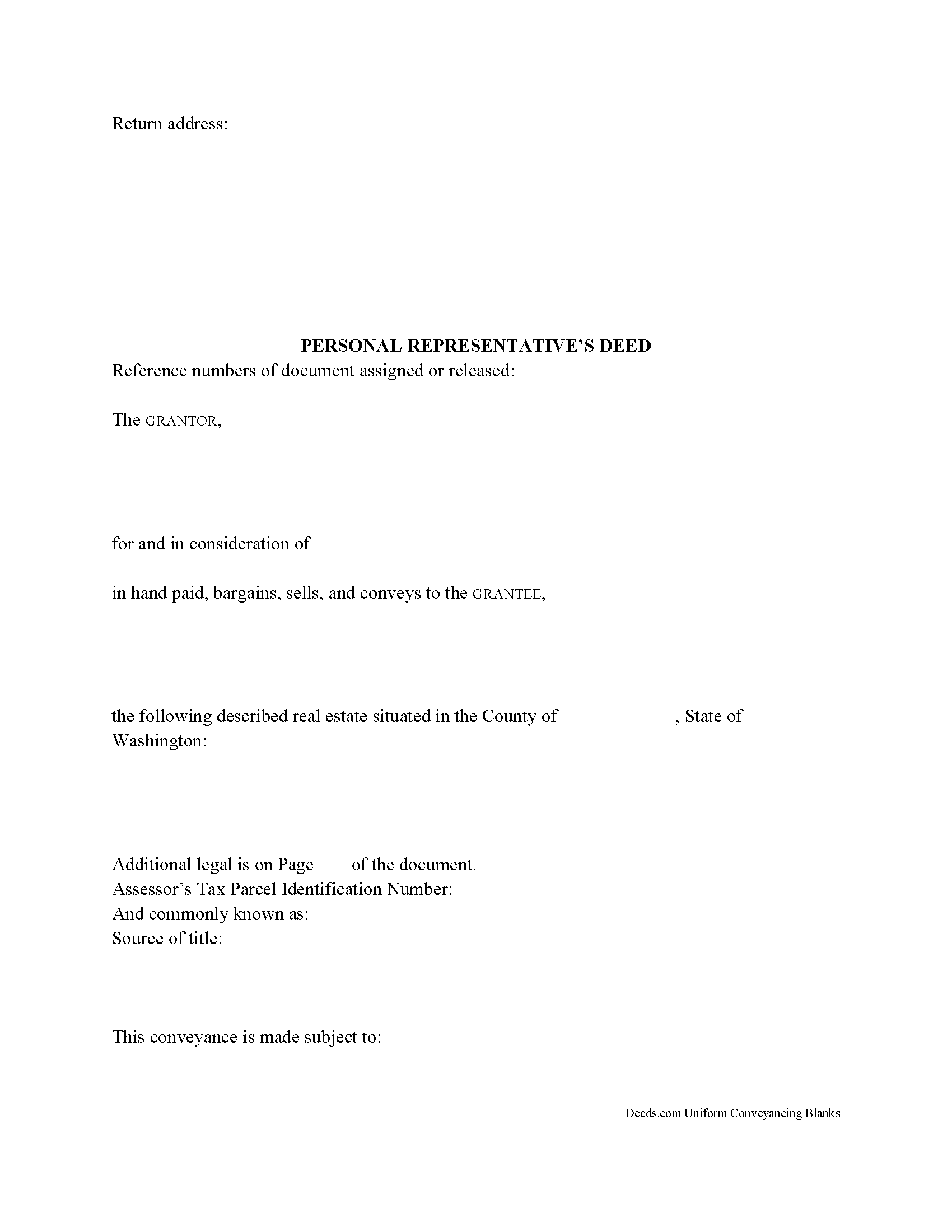
Washington State Probate and Sales of Real Property
Probate is the legal process of settling a decedent's estate and transferring any remaining assets to those entitled to receive them. Procedures for probate of wills and distribution of estates are codified at RCW Title 11.
When a decedent dies leaving a will, the estate is said to be testate. If a decedent does not leave a will or the will is not found valid by the court, the estate is intestate. Persons named in a decedent's will to inherit a part of the estate are called devisees.
Any assets not disposed of by will are distributed to heirs at law in the order specified at RCW 11.04.015. Typically, all assets titled solely in the decedent's name are subject to probate. Nonprobate assets include interests that pass with a right of survivorship, by transfer on death, or by community property agreement, and assets held in a grantor trust (RCW 11.02.005(10)).
Washington is a community property state, meaning that, upon the death of the first spouse, a one-half share of the community property, property acquired during the marriage, succeeds to the surviving spouse, with the other one-half share subject to disposition by ... More Information about the Washington Personal Representative Deed
Affidavit of Deceased Joint Tenant
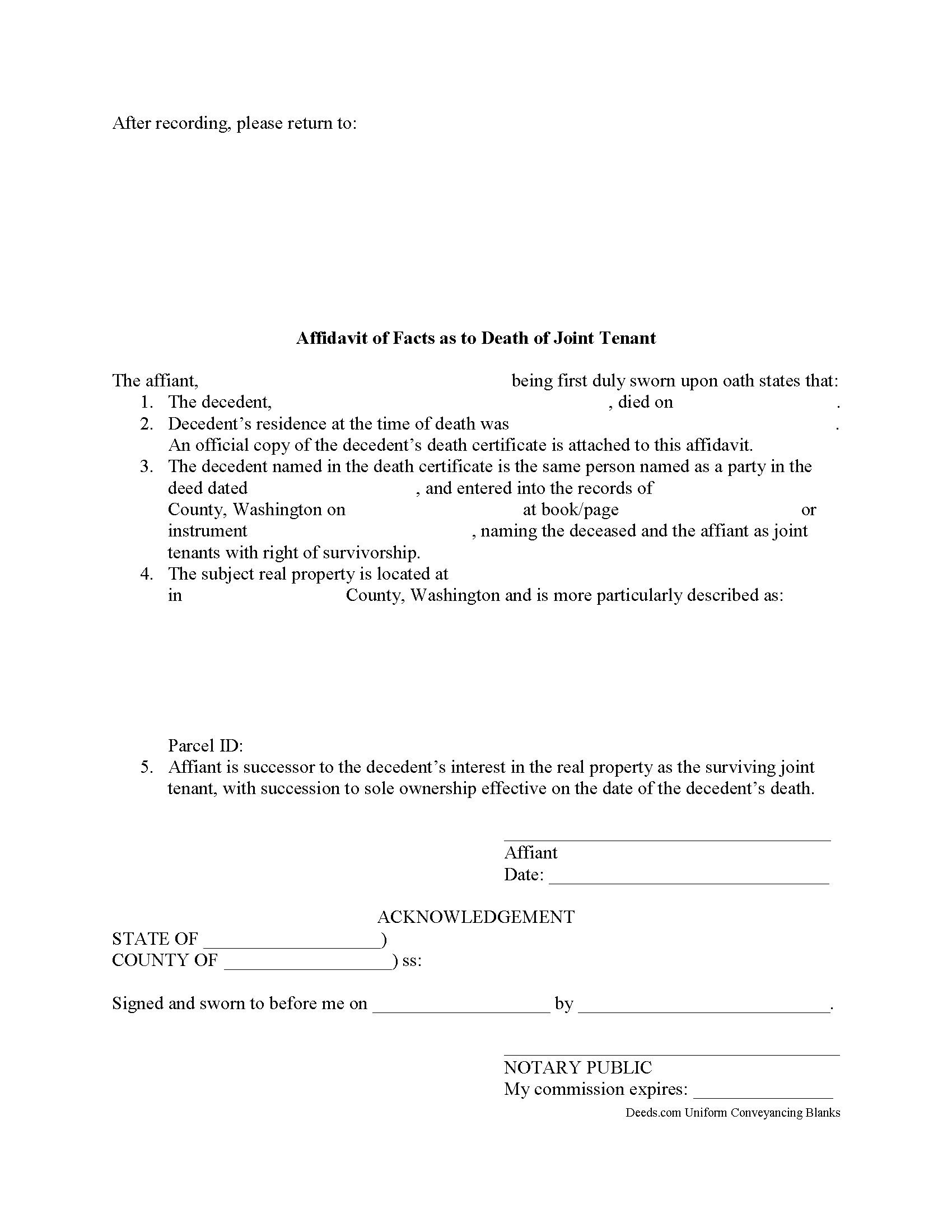
Removing a Deceased Joint Tenant from a Washington Real Estate Title
Washington's statutes define joint tenancy at RCW 64.28.010. This law states that "joint tenancy with right of survivorship permits property to pass to the survivor without the cost or delay of probate proceedings." Property titled this way is not passed in a will; instead, a deceased joint tenant's share is distributed equally amongst the survivors as a function of law until only one person holds the property in sole ownership.
While technically accurate, this description oversimplifies the situation. What happens when it's time to sell the property? Unless the local recording office cross-references death notices with real estate records, the deceased owner's name remains on the title. This inaccuracy can create confusion during a title search and slow down the transfer process. In addition, outdated information might interfere with property tax billing, possibly leading to fees and/or penalties.
The surviving owner(s) can prevent these potential issues with a simple step: when one joint tenant dies, the other(s) execute and record an affidavit of facts as to death with the local recording office. It i... More Information about the Washington Affidavit of Deceased Joint Tenant
Trustee Deed
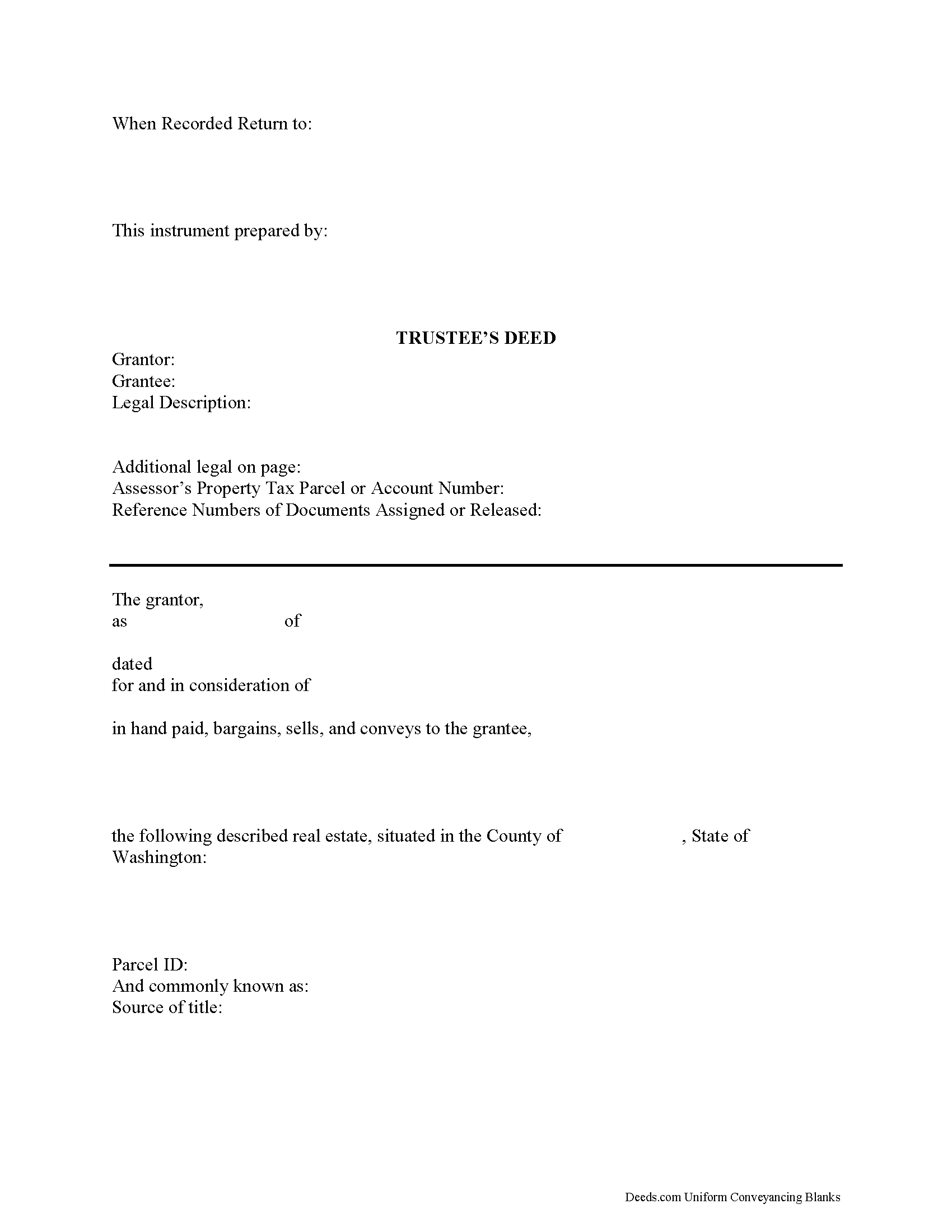
Washington State Trustee's Deed to Convey Living Trust Property
Transferring real property from a living trust requires a trustee's deed, not to be confused with the trustee's deed following foreclosure of a deed of trust. The trustee's deed to convey living trust real estate in Washington State is a bargain and sale deed (a statutory form in Washington under RCW 64.04.040) that has been descriptively named for the executing party.
In a living trust, a settlor transfers assets to another person (the trustee) for the benefit of someone else (the beneficiary). In many living trust arrangements, these roles may be performed by the same person, so long as the sole trustee is not also the sole beneficiary. The living trust is an estate planning tool established by the settlor (by the execution of a trust instrument and the funding of the trust), who receives the benefit of the trust during his lifetime. The settlor administers the trust during his lifetime as trustee, though not always, and typically designates a successor trustee to replace him as trustee in the event of death or incapacitation.
Real property is transferred into trust by a deed from the settlor, granting the ... More Information about the Washington Trustee Deed
Certificate of Trust
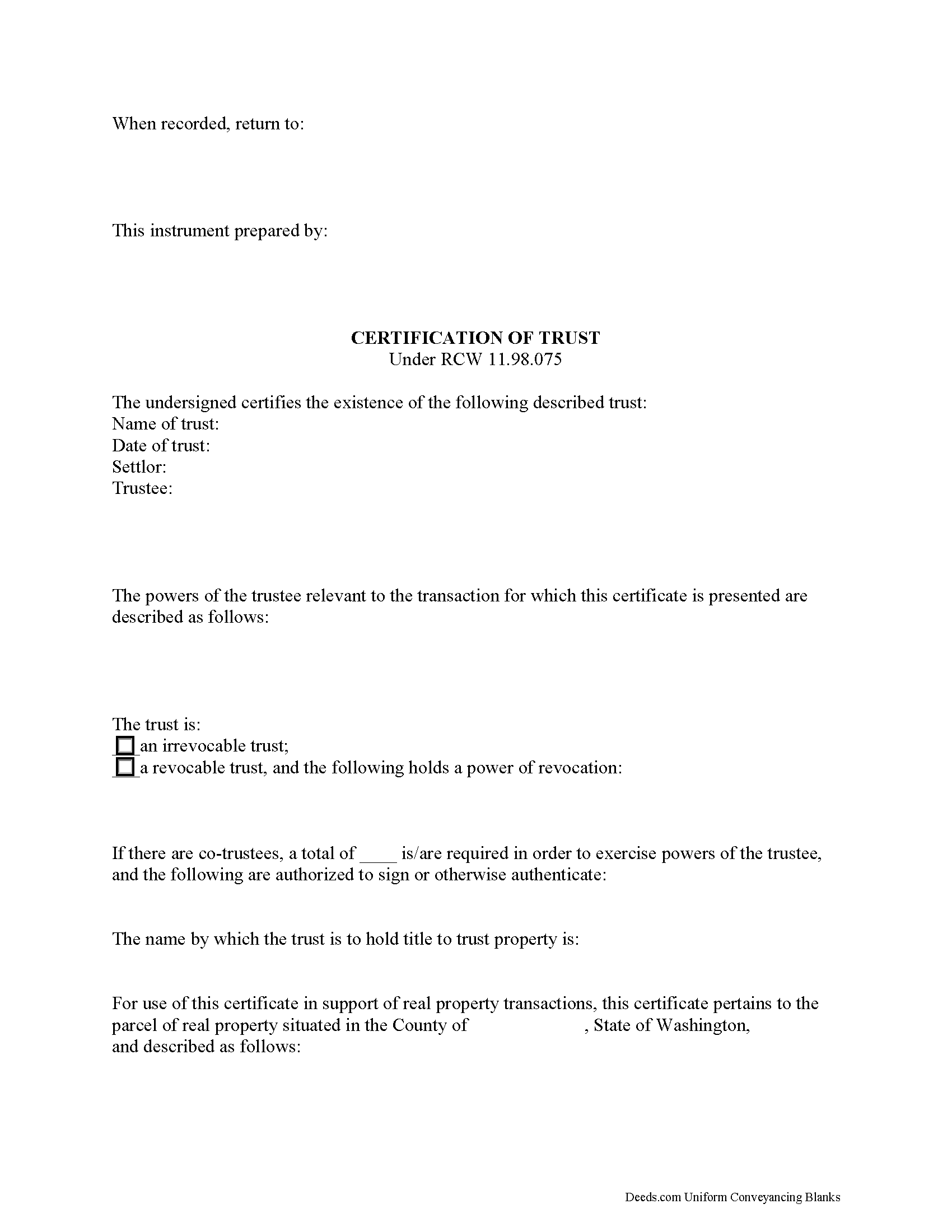
Washington State Certification of Trust
When doing business with a trustee, third parties (such as financial institutions) may request a certification of trust, a statutory document that certifies the existence of a trust and outlines the trustee's powers and authority to act on the trust's behalf. In Washington, the certificate, taken from section 1013 of the Uniform Trust Code, is codified at RCW 11.98.075 as part of the probate and trust law of Washington.
In lieu of presenting parties outside of the trust arrangement (essentially, anyone who is not a trust beneficiary) with the entire trust document, RCW 11.98.075 allows the trustee to supply a certificate of trust containing the essential information about the trust necessary for the transaction at hand, and not "the dispositive terms of the trust" (RCW 11.98.075(4)). This allows the settlor's estate plans to remain private, including the identity of trust beneficiaries.
The certificate requires a statement that the trust exists, along with the name and date of the trust, the identity of the trust's settlor, and the name and address of each current trustee serving the trust. The document also establishes the relevant... More Information about the Washington Certificate of Trust
Disclaimer of Interest
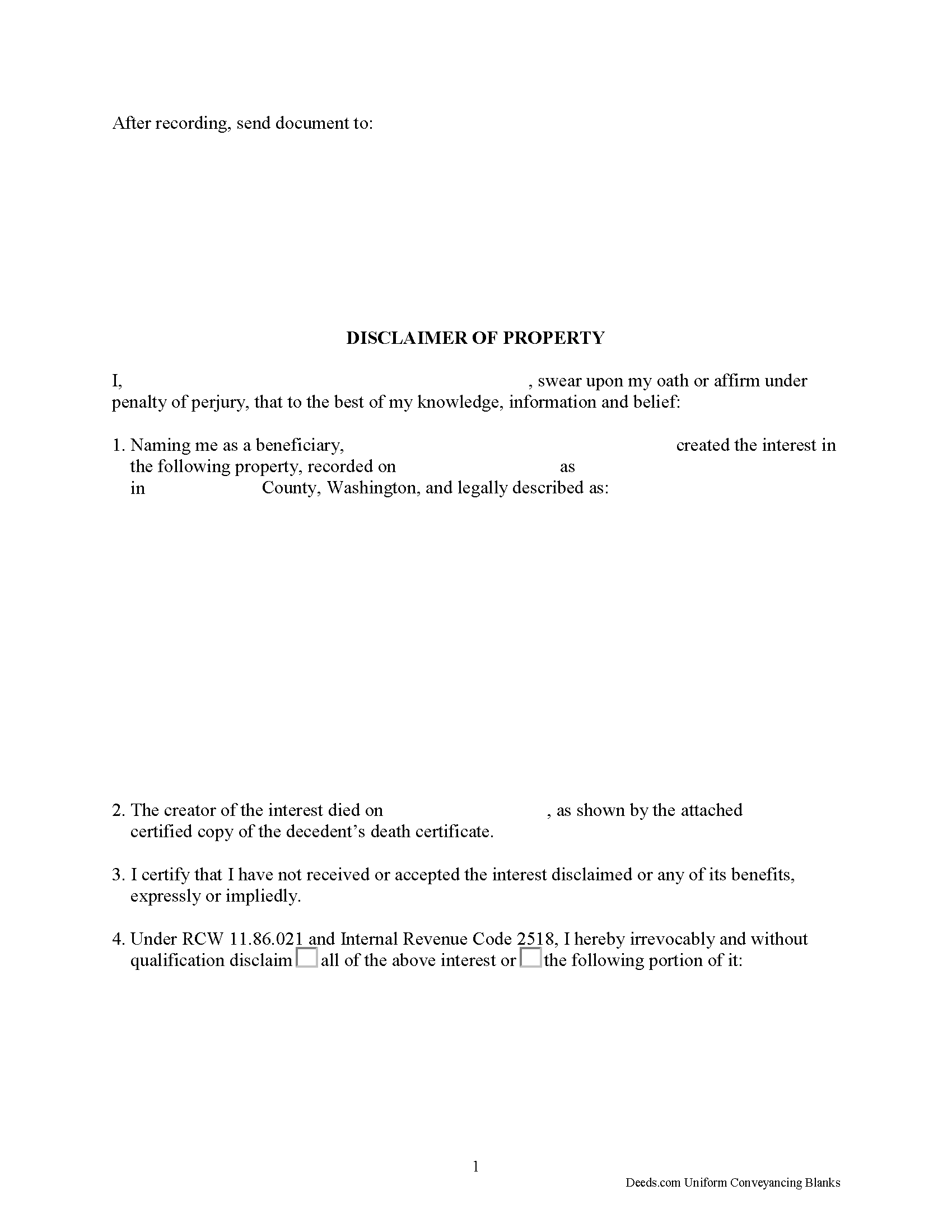
A beneficiary of an interest in property in Washington can renounce all or part of a bequeathed interest in, or power over, that property under RCW 11.86.021 as long as it has not been accepted through actions that indicate ownership or transferred in any way (RCW 11.86.051). The written disclaimer must identify the creator of the interest, provide a description of the disclaimed interest, a declaration of the disclaimer and its extent, and it needs to be signed by the disclaiming party (RCW 11.86.031).
Deliver the disclaimer within nine months of the transfer (e.g., the death of the creator of the interest) to the personal representative of the decedent's estate or the court having jurisdiction to appoint such a person (RCW 11.86.031(3-4)). In the case of real property, record the disclaimer in the county where the property is located (RCW 11.86.031(5)).
A disclaimer is irrevocable and binding for the disclaiming party and those claiming under him or her, so be sure to consult an attorney when in doubt about the drawbacks and benefits of disclaiming inherited property or if the disclaimed interest arises out of jointly-owned property.
(Washington DOI Package includes fo... More Information about the Washington Disclaimer of Interest
General Durable Power of Attorney RCW 11.125 ET SEQ.
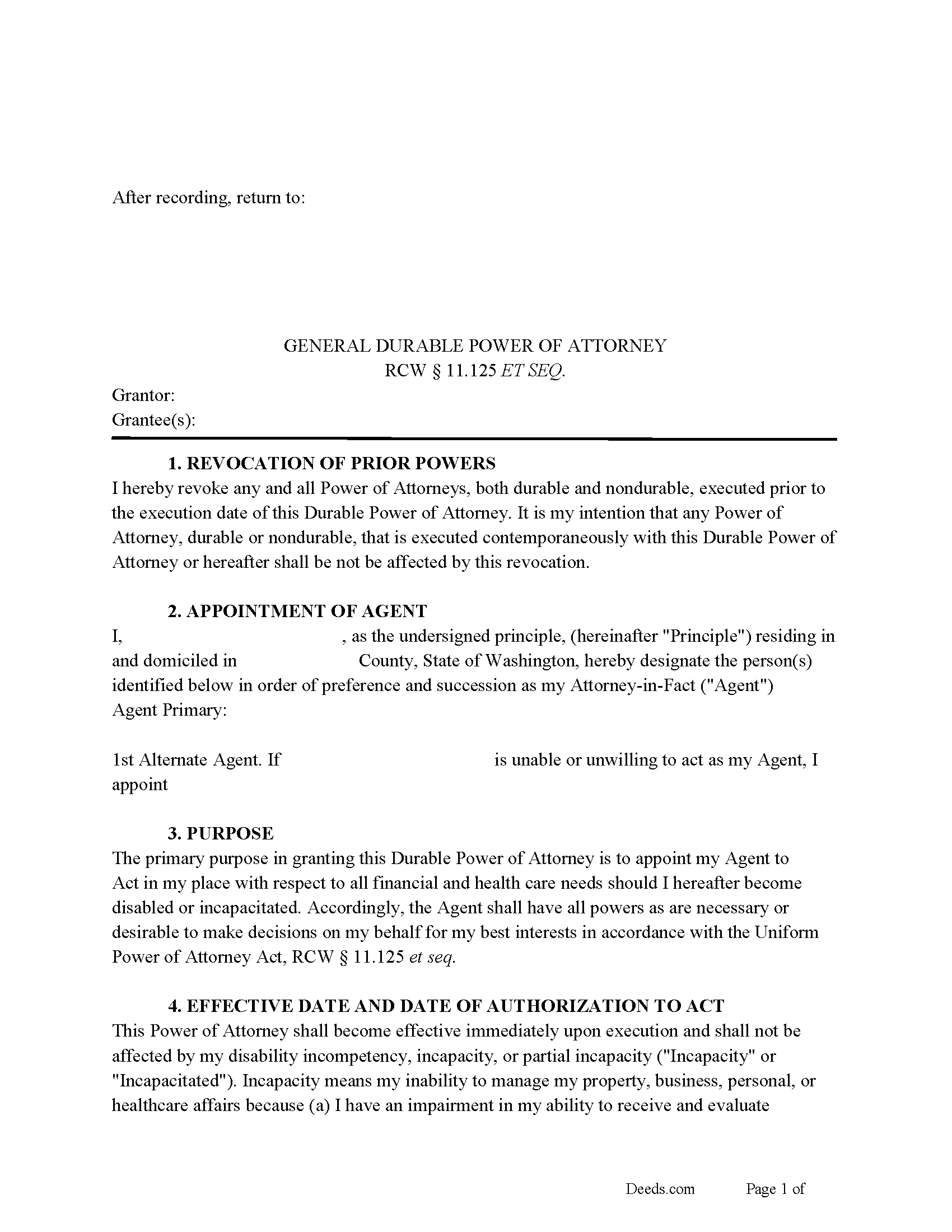
The primary purpose in granting this Durable Power of Attorney is to appoint an Agent to
Act in your place with respect to all financial and health care needs should you become disabled or incapacitated. Accordingly, the Agent shall have all powers as are necessary or desirable to make decisions on your behalf for your best interests in accordance with the Uniform Power of Attorney Act, RCW 11.125 et seq.
This Power of Attorney revokes any and all previous Powers of Attorney.
Appoints a Primary Agent and Alternate Agent if needed.
Termination:
As long as you have capacity, you may revoke this Power of Attorney by written notice to your Agent and, if this Durable Power of Attorney is recorded, by recording the same written notice of revocation in the county office where deeds are recorded. Otherwise, this Durable Power of Attorney shall terminate upon your death in all respects, other than the disposition of your remains as authorized under RCW 68.50.160.
Applicable Law:
The laws of the State of Washington shall govern this Power of Attorney.
Fully formatted for County recording requirements. (Washington GDPOA Package includes form, guidelines, and completed exampl... More Information about the Washington General Durable Power of Attorney RCW 11.125 ET SEQ.
Special Power of Attorney for the Purchase of Property
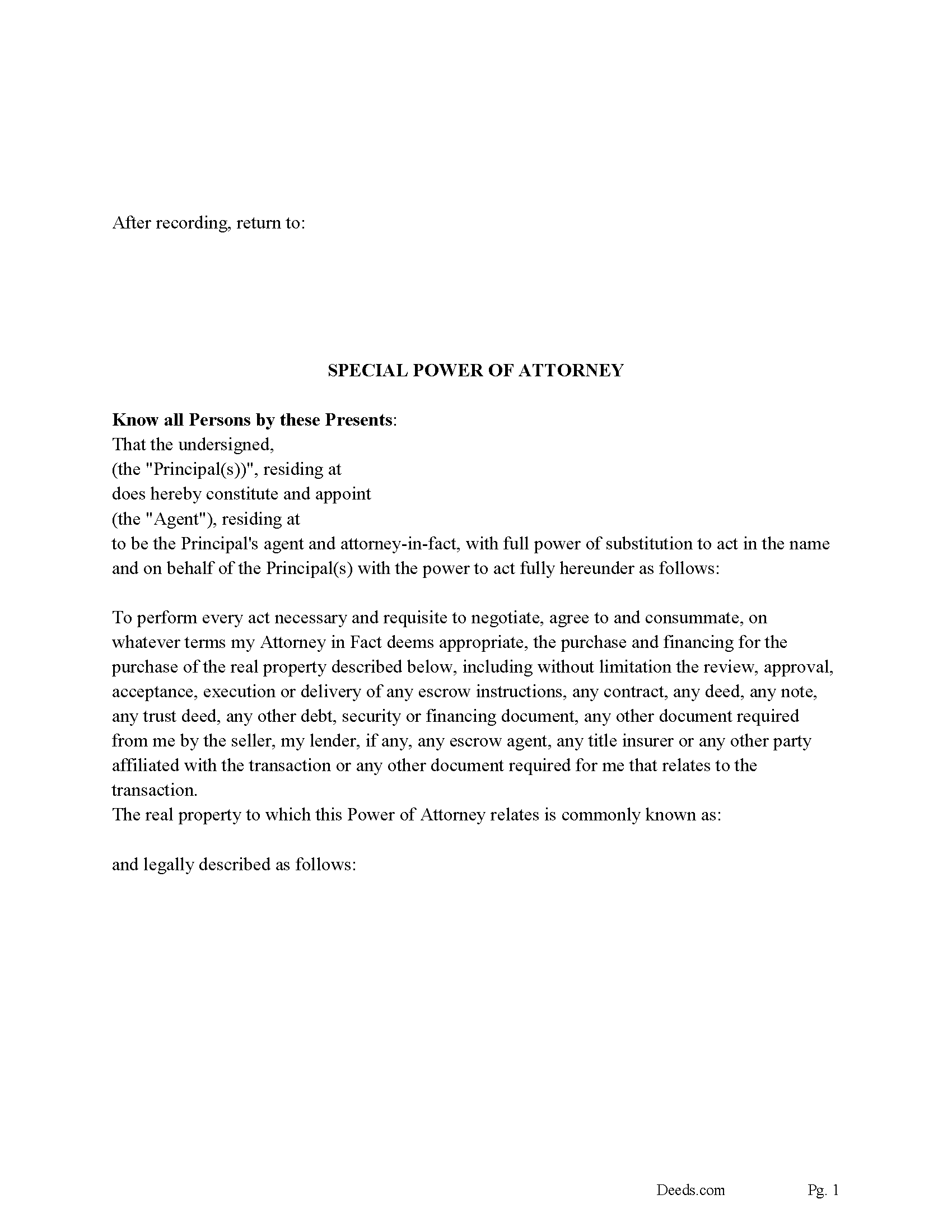
In this form the principal(s) empower(s) an agent to act on the principal's behalf, for the purchase and financing of a real property located in the State of Washington, including without limitation the review, approval, acceptance, execution or delivery of any escrow instructions, any contract, any deed, any note, any trust deed, any other debt, security or financing document, any other document required from the principle(s) by the seller, lender, if any, any escrow agent, any title insurer or any other party affiliated with the transaction or any other document required that relates to the transaction.
Included is a "Special Instructions" section where the agent's powers can be further limited or defined by the preparer.
Title Companies, banks, etc. often require an agent's certification form, documenting the agent's authority and validity, this form is included as per RCW 11.125.430
This power of attorney is not affected by any subsequent disability or incapacity of the principal and shall be considered a "Durable Power of Attorney." This power of attorney terminates on a date that is provided by the principal. Shall be governed, as to its validity, terms and enforcemen... More Information about the Washington Special Power of Attorney for the Purchase of Property
Special Power of Attorney for the Sale of Property
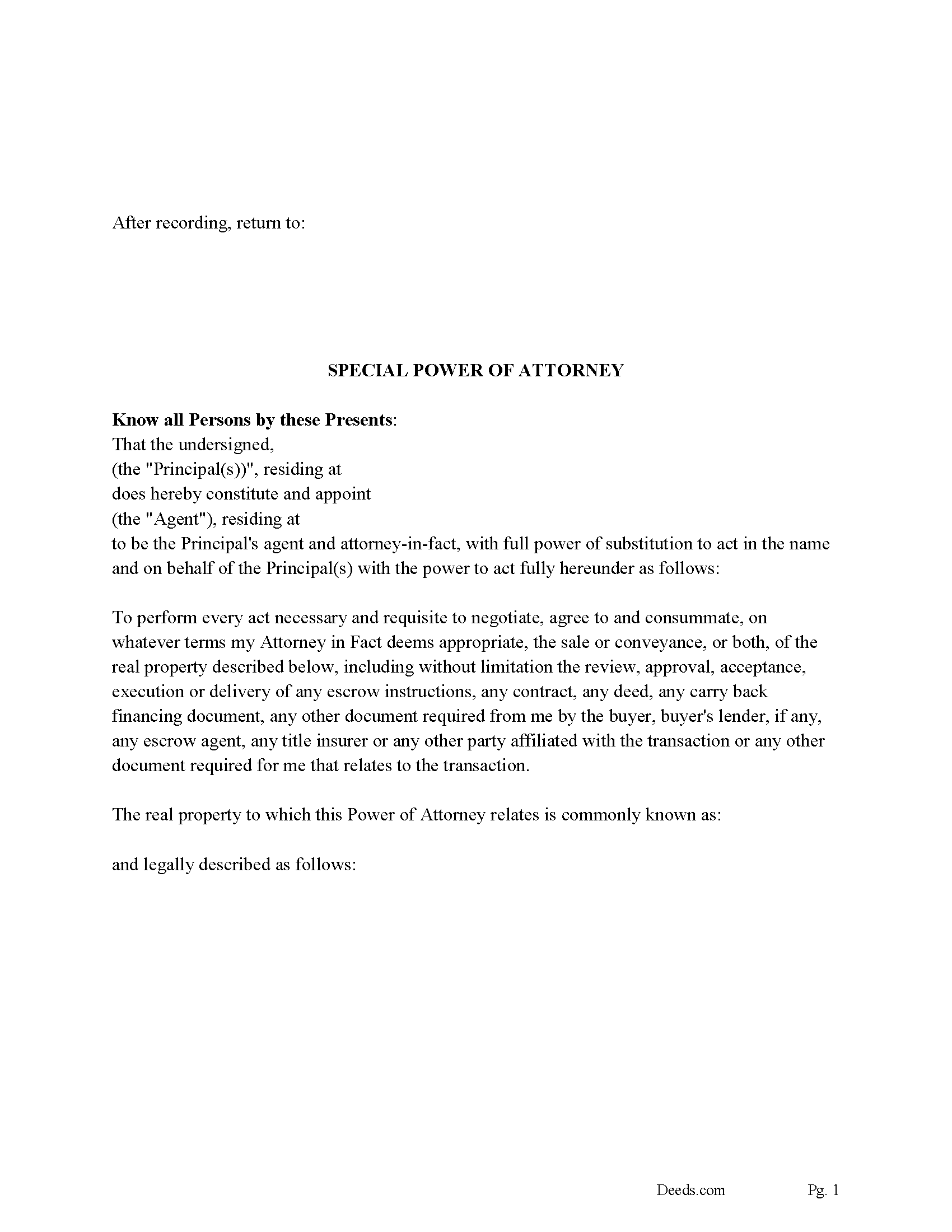
In this form the principal(s) empower(s) an agent to act on the principal's behalf, for the Sale of a real property located in the State of Washington. The agent is authorized to perform every act necessary and requisite to negotiate, agree to and consummate, on whatever terms the Attorney in Fact deems appropriate, the sale or conveyance, or both, of the real property described. A "Special Instructions" section is included where the agent's powers can be further limited or defined.
Title Companies, banks, etc. often require an agent's certification form, documenting the agent's authority and validity, this form is included as per RCW 11.125.430
This power of attorney is not affected by any subsequent disability or incapacity of the principal and shall be considered a "Durable Power of Attorney." This power of attorney terminates on a date that is provided by the principal. Shall be governed, as to its validity, terms and enforcement, by those laws of the State of Washington.
(Washington SPOA-Sale Package includes form, guidelines, and completed example) For use in Washington only.
... More Information about the Washington Special Power of Attorney for the Sale of Property
Deed of Trust and Promissory Note
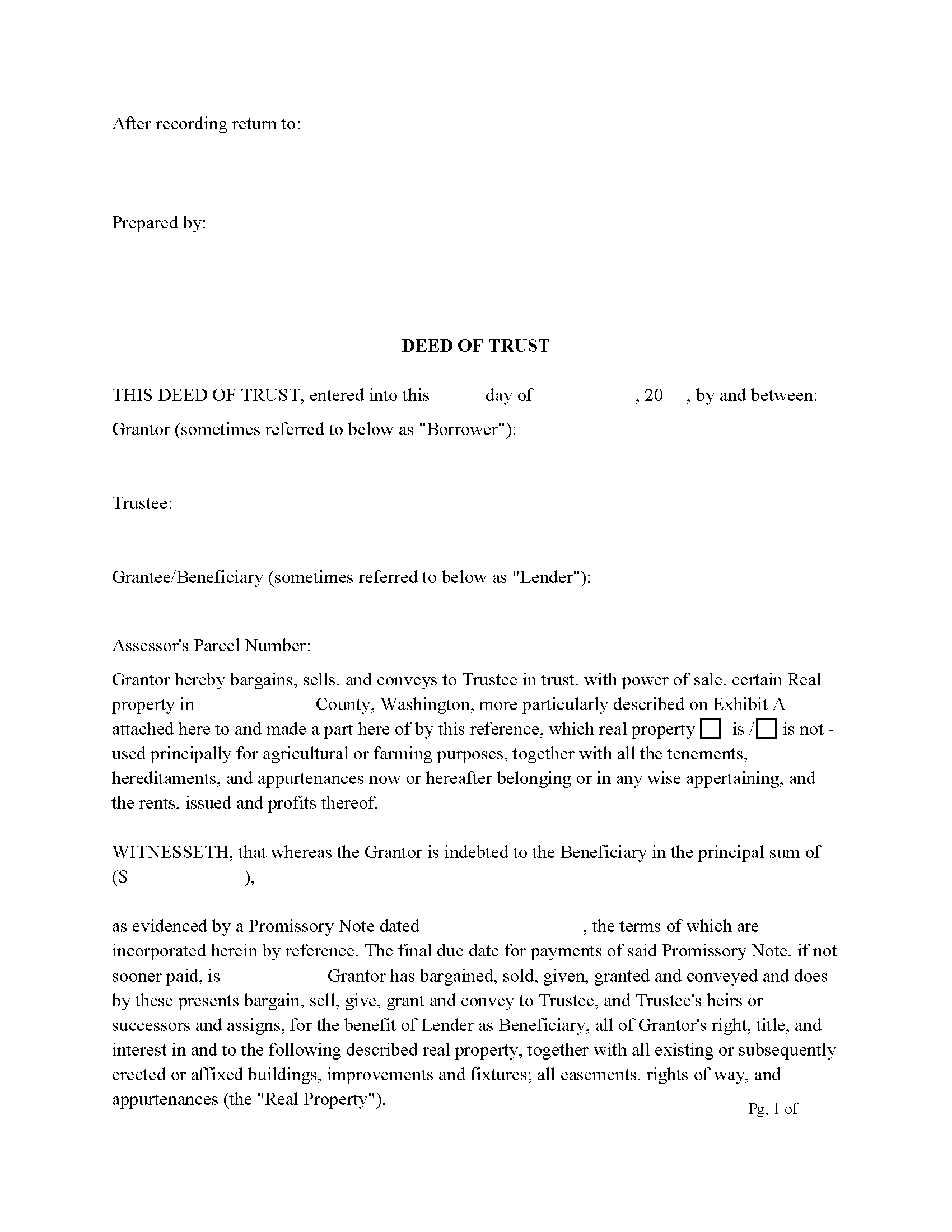
A deed of trust (DOT), is a document that conveys title to real property to a trustee as security for a loan until the grantor (borrower) repays the lender according to terms defined in an attached promissory note. It's similar to a mortgage but differs in that mortgages only include two parties (borrower and lender).
In Washington, a Deed of Trust is the most commonly used instrument to secure a loan. Foreclosure can be done non-judicially, saving time and expense. This process is called a Trustee Sale.
There are three parties in this Deed of Trust:
1- The Grantor (Borrower)
2- Beneficiary (Lender) and a
3- Trustee (Neutral Third Party) (Our guidelines will show how to choose a Trustee at little to no cost)
Basic Concept. The Trustor (Borrower) conveys property title to a Trustee (Neutral Party). A Trustee or beneficiary/Lender can take an action against any person for damages.
These forms are flexible, they can be used for financing residential property, agricultural property, rental property, condominiums, and or small office buildings, with or without existing liens and encumbrances.
A "Special Provisions" section is included for any information specific to your... More Information about the Washington Deed of Trust and Promissory Note
Full Reconveyance for Deed of Trust
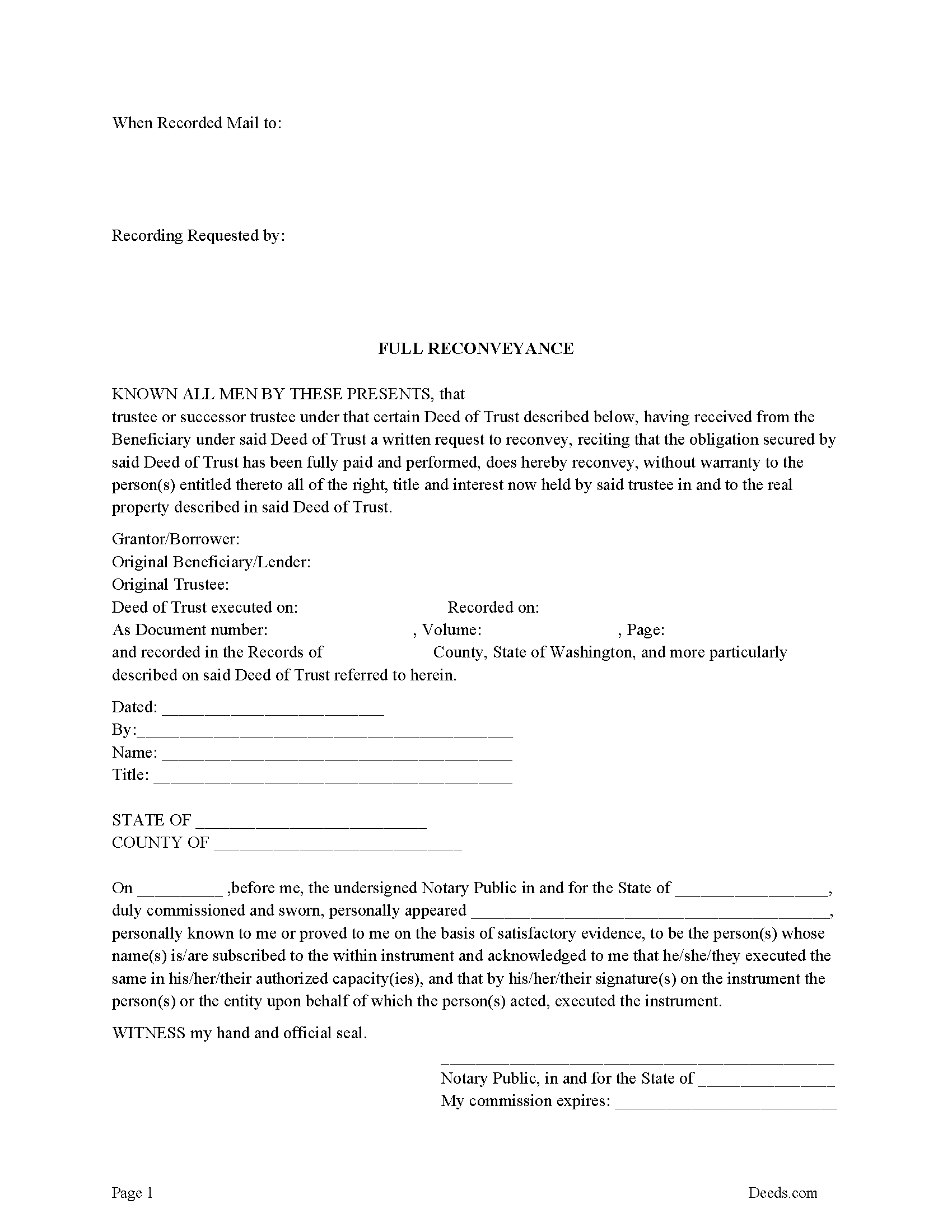
Use this form when a Deed of Trust is paid in full, The Beneficiary/Lender sends written notice to the Trustee to reconvey title without warranty to the Grantor/Borrower entitled thereto all of the right, title and interest now held by said trustee.
RCW 61.24.110
Reconveyance by trustee.
(1) The trustee of record shall reconvey all or any part of the property encumbered by the deed of trust to the person entitled thereto on written request of the beneficiary, or upon satisfaction of the obligation secured and written request for reconveyance made by the beneficiary or the person entitled thereto.
(Washington Full Reconveyance of DOT Package includes form, guidelines, and completed example) For use in Washington only.
... More Information about the Washington Full Reconveyance for Deed of Trust
Assignment of Deed of Trust
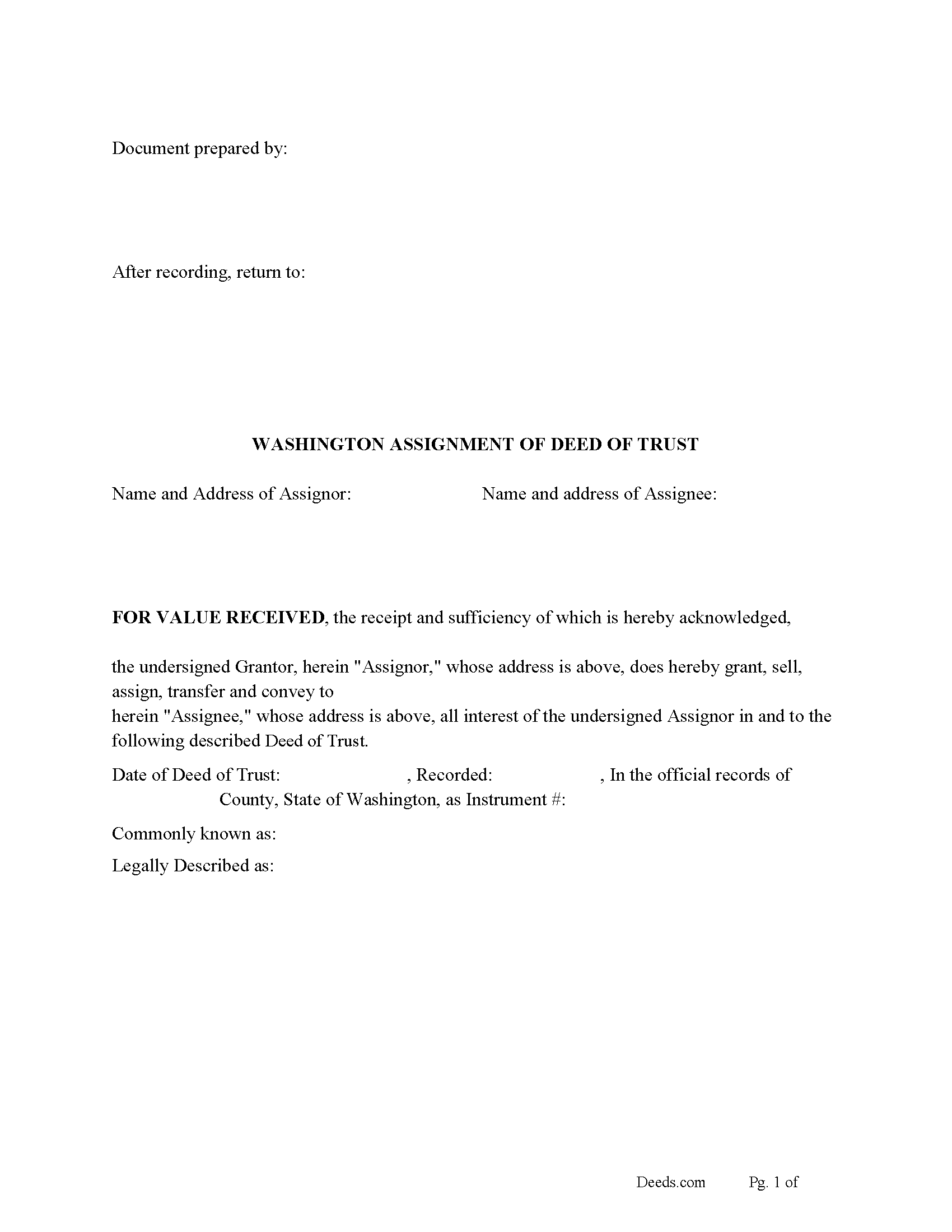
Use this form to grant and assign an existing Deed of Trust to an assignee (by an instrument in writing, signed and acknowledged in the manner provided by law entitling mortgages to be recorded, assign the same to the person therein named as assignee) Once completed record the assignment in the auditor's office of the county where the Deed of Trust was recorded. For use by individuals or corporations. (RCW 61.16.010)
By law the current borrowers must be notified of the assignment and change of creditors with contact information, generally within 30 days to avoid penalty. Included are "Notice of Assignment of Deed of Trust" forms.
(Washington Assignment of DOT Package includes form, guidelines, and completed example) For use in Washington only.
... More Information about the Washington Assignment of Deed of Trust
Substitute of Trustee and Full Reconveyance
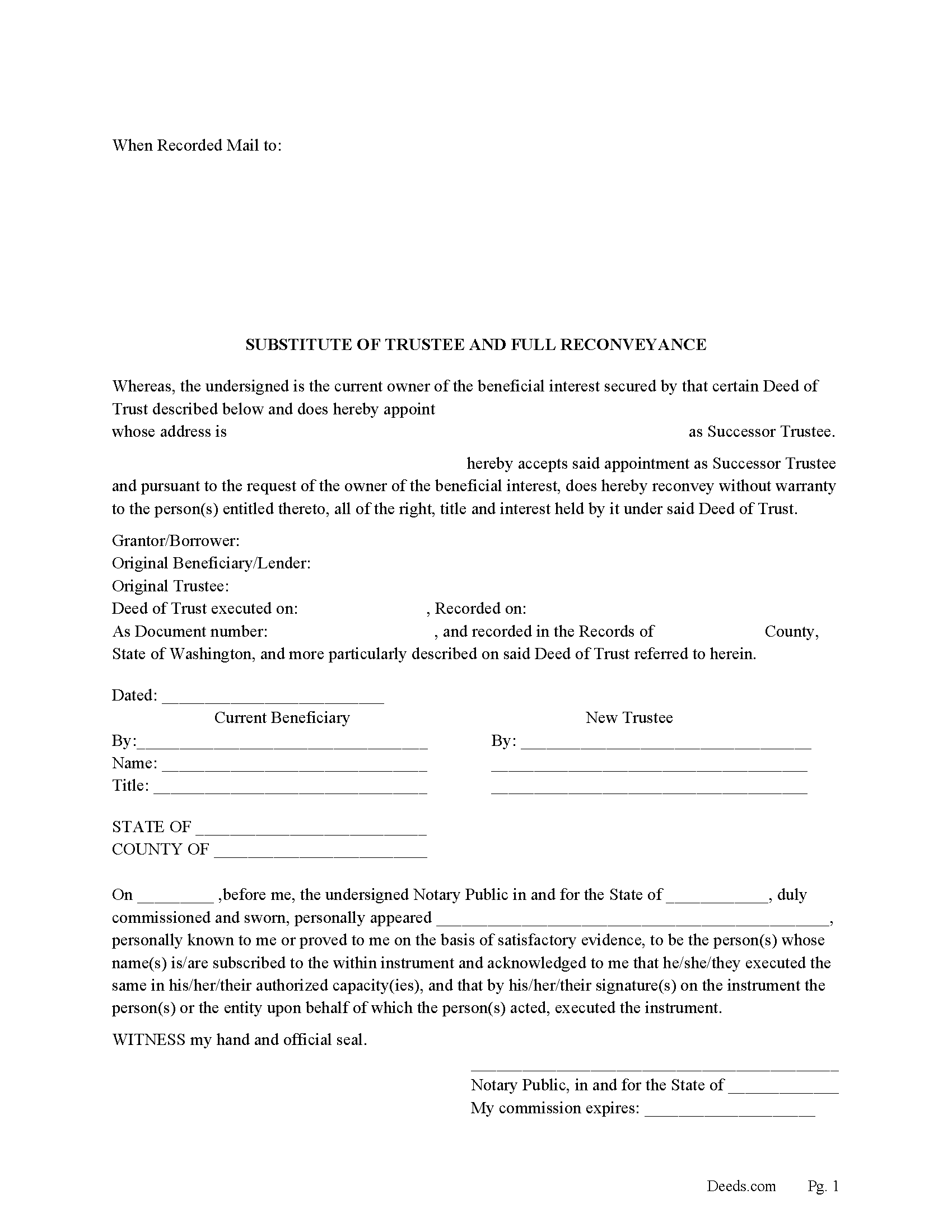
Use the form when the original Trustee designated on a Deed of Trust is unable or unwilling to Reconvey Title for a Deed of Trust that is fully satisfied/paid in full. The acting Beneficiary/Lender authorizes a new Substitute Trustee to perform this task, who, by recording it, will release the lien and convey the property with a clear title
(Washington SOT and Full Reconveyance Package includes form, guidelines, and completed example) For use in Washington only.
... More Information about the Washington Substitute of Trustee and Full Reconveyance
Memorandum and Notice of Agreement
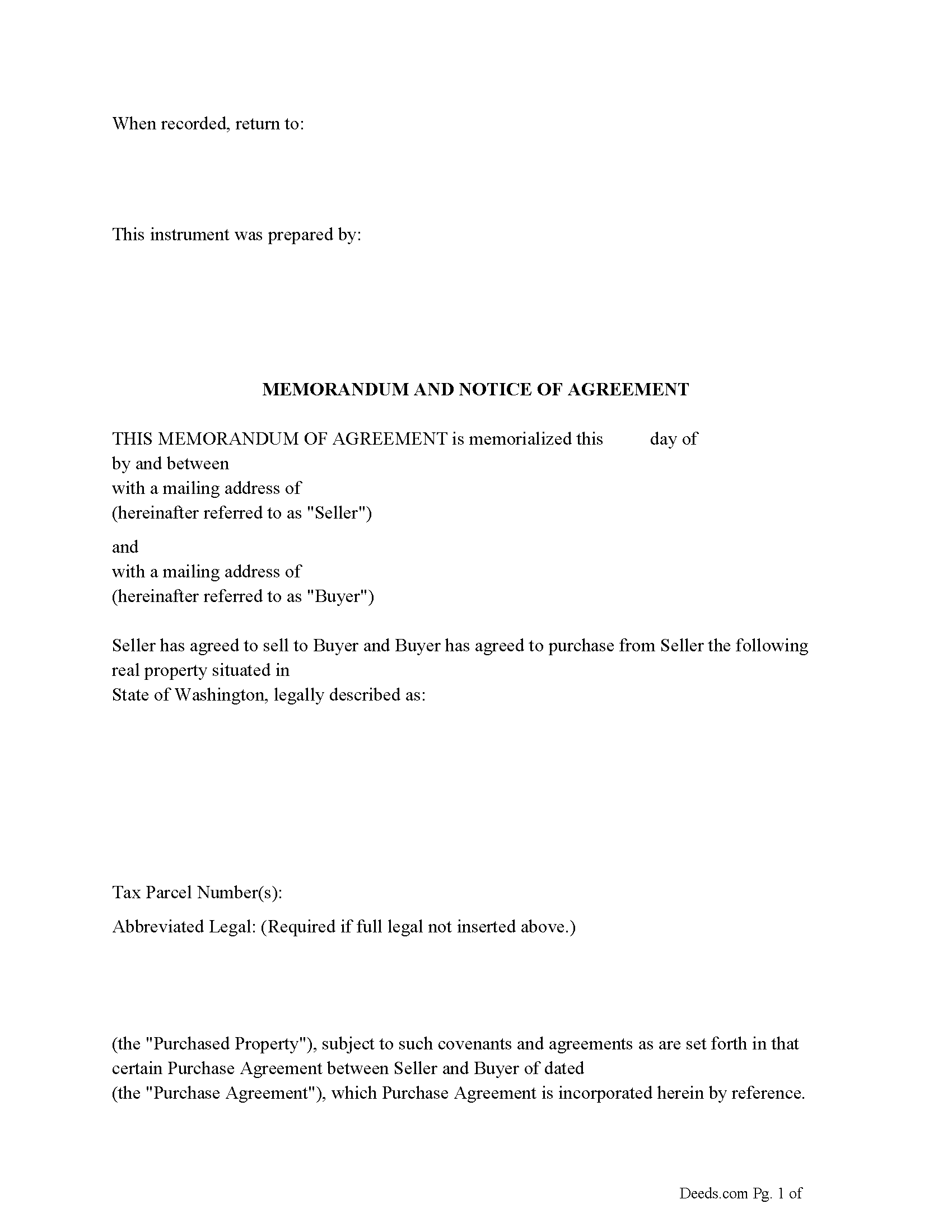
A "Memorandum of Purchase Agreement" commonly referred to as a "Memorandum of Agreement" (MOA) or "Memorandum of Understanding" (MOU) in the context of real estate, is used primarily as a means to provide public notice of an equitable interest in a real estate transaction without disclosing the full details of the purchase agreement. This document is particularly useful in transactions where the buyer and seller have agreed to terms but the final closing and transfer of the deed have not yet occurred. By recording this memorandum with the county recorder's office, the buyer establishes a public record of their interest in the property, which can protect against subsequent claims or liens by third parties.
Key Purposes of a Memorandum of Purchase Agreement:
1. Notice of Equitable Interest: The memorandum serves as notice to the public that the buyer has an equitable interest in the property due to the purchase agreement. This is important in protecting the buyer’s interest against claims by other parties who might otherwise be unaware of the agreement.
2. Protection During the Closing Process: Real estate transactions can involve a lengthy closing process, including financ... More Information about the Washington Memorandum and Notice of Agreement
Mineral Deed
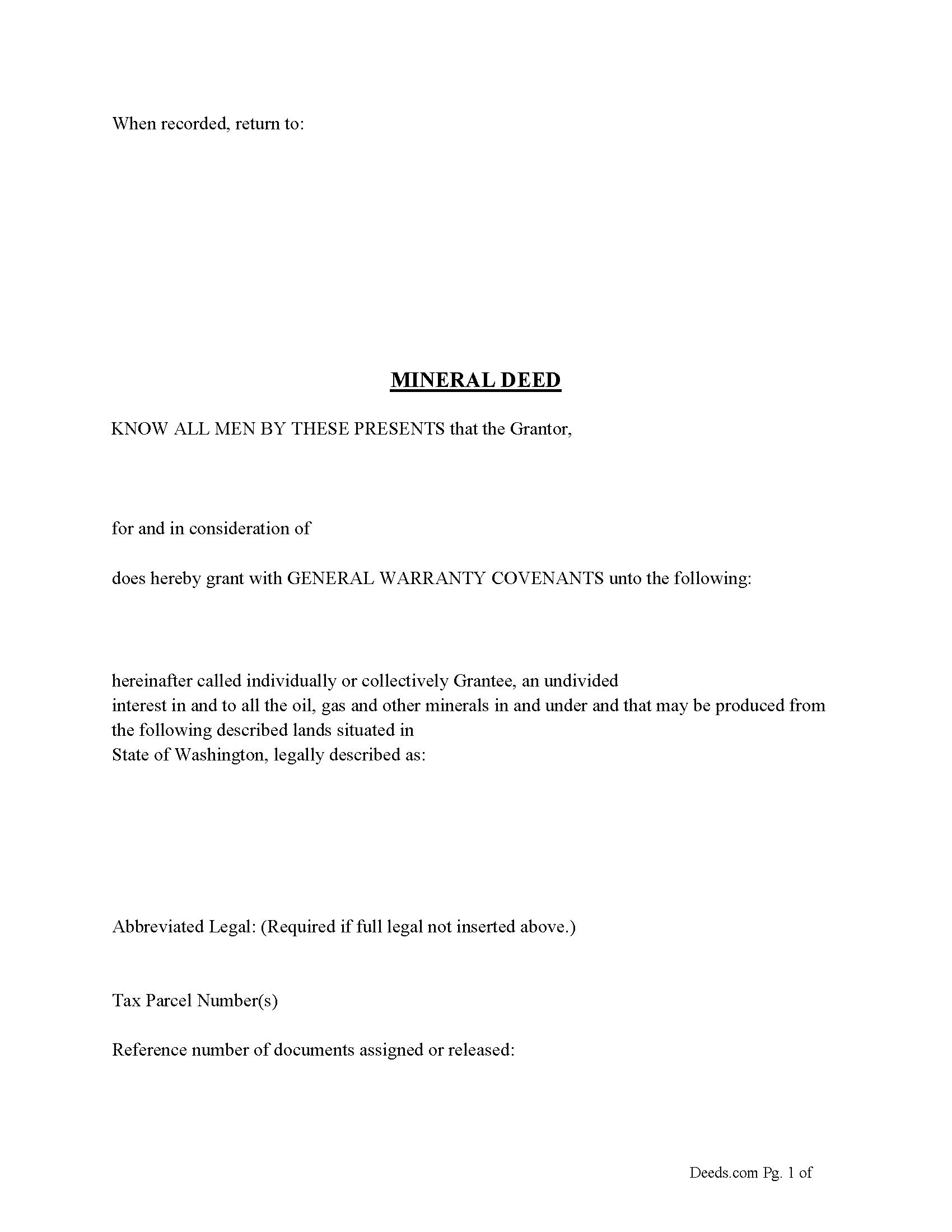
The General Mineral Deed in Washington transfers oil, gas, and mineral rights from the grantor to the grantee. THIS IS NOT A LEASE. There are no Exceptions or Reservations included.
The transfer includes the oil, gas and other minerals of every kind and nature. It also transfers any and all rights to receive royalties, overriding royalties, net profits interests or other payments out of or with respect to those oil, gas and other minerals. The Grantor can stipulate the percentage of Mineral Rights the Grantee will receive and is made subject to any rights existing under any valid and subsisting oil and gas lease or leases of record.
This general mineral deed gives the grantee the right to access, for the purpose of mining, drilling, exploring, operating and developing said lands for oil, gas, and other minerals, and storing handling, transporting and marketing of such.
In this document the Grantor Warrants and will defend said Title to Grantee. Use of this document has a permanent effect on your rights to the property, if you are not completely sure of what you are executing seek the advice of a legal professional.
(Mineral Deed Package includes form, guidelines, and co... More Information about the Washington Mineral Deed
Mineral Deed with Quitclaim Covenants
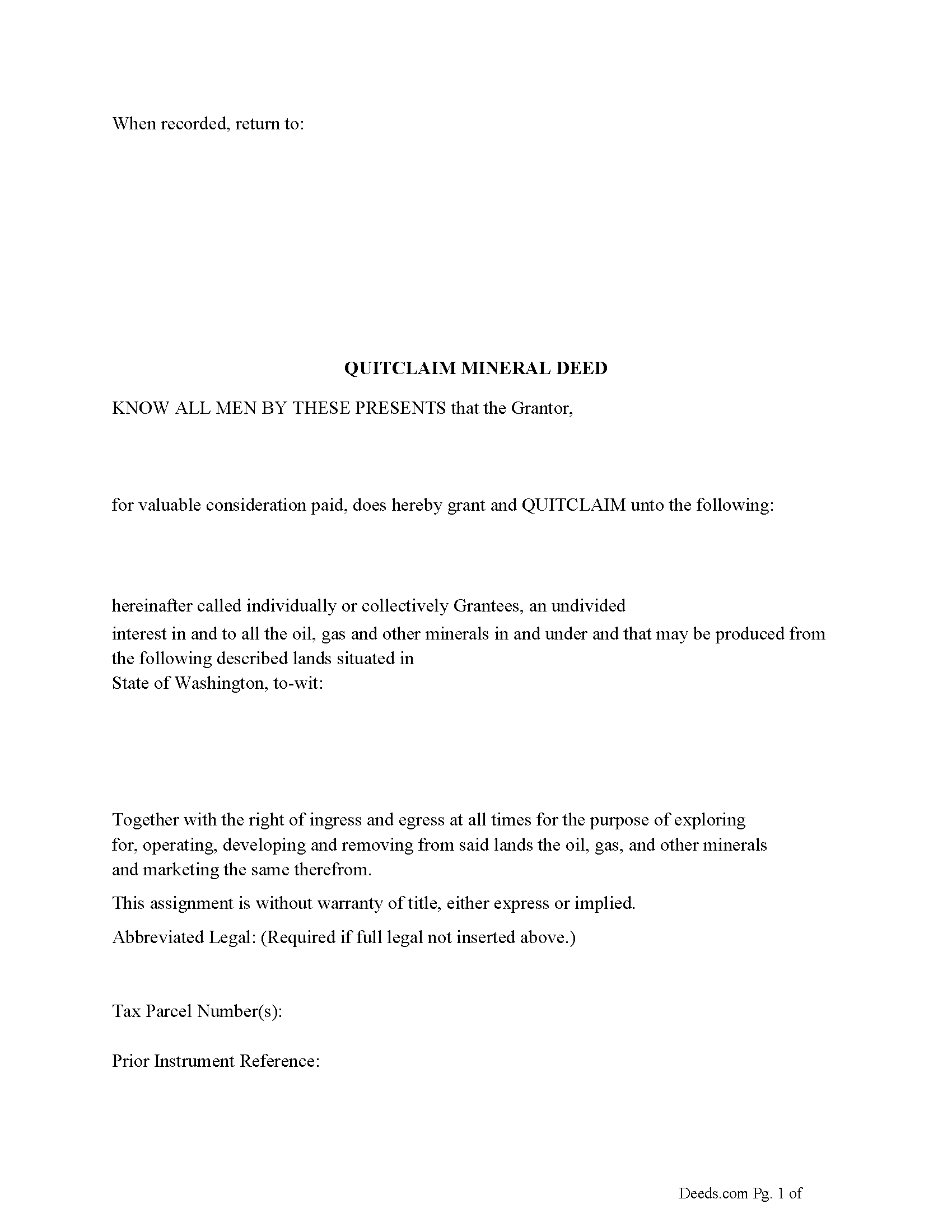
The General Mineral Deed in Washington Quitclaims oil, gas, and mineral rights from the grantor to the grantee. THIS IS NOT A LEASE. There are no Exceptions or Reservations included.
The transfer includes the oil, gas and other minerals of every kind and nature. The Grantor can stipulate the percentage of Mineral Rights the Grantee will receive.
This general mineral deed gives the grantee the right to access, for the purpose of mining, drilling, exploring, operating and developing said lands for oil, gas, and other minerals, and storing handling, transporting and marketing of such.
The seller, or grantor Quitclaims the mineral rights and does NOT accept responsibility to any discrepancy of title (This assignment is without warranty of title, either express or implied)
Uses: Mineral deeds with quitclaim are often used in situations where the grantor wants to quickly release any interest they might have in mineral rights, such as in settling estates, resolving disputes, clearing up uncertainties about ownership in a title's history or when mineral rights have previously been severed or fragmented from surface rights and cloud a title, making it difficult to transfer prope... More Information about the Washington Mineral Deed with Quitclaim Covenants
Lis Pendens
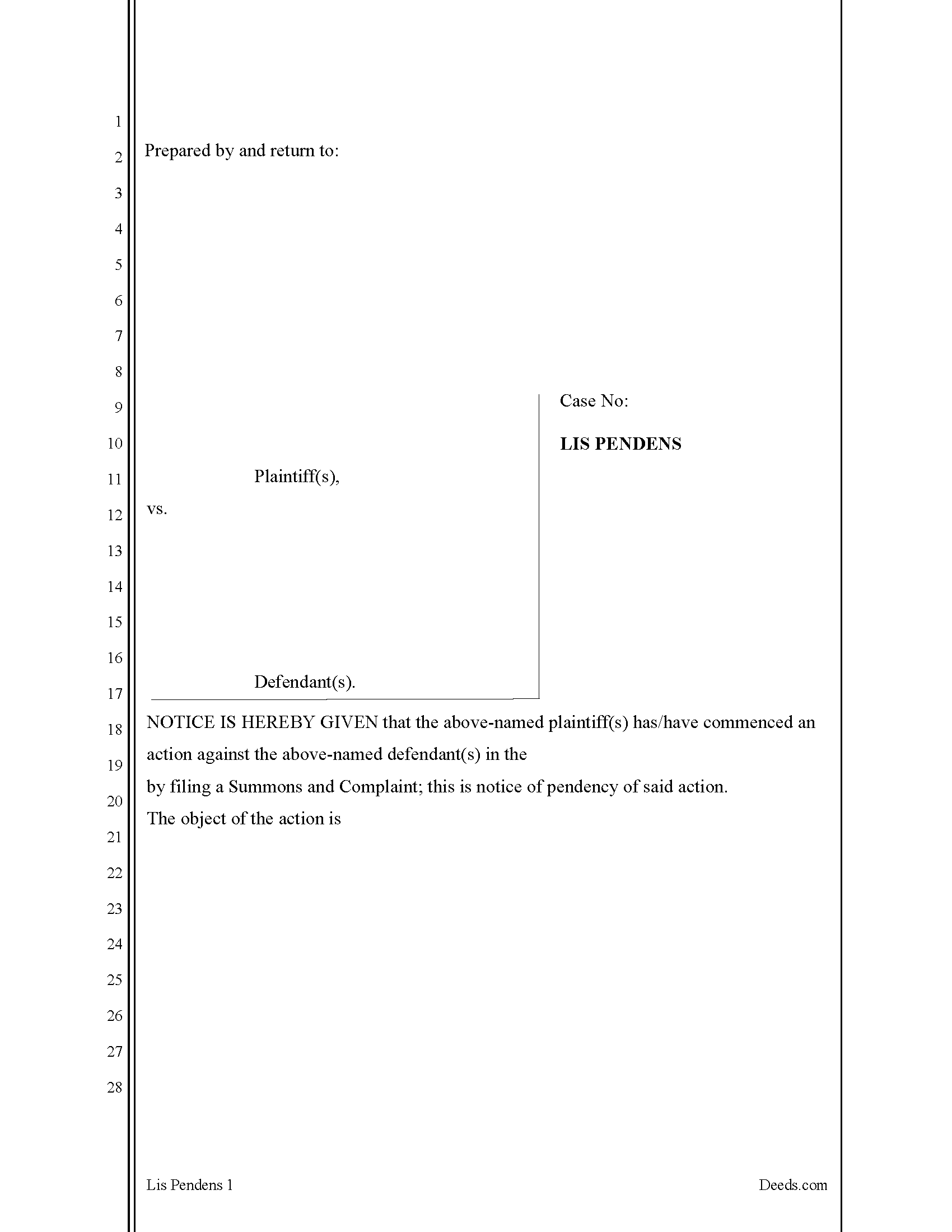
When an action that has been commenced and affects title to real property, any party to the case may file a Lis Pendens. Once recorded the Lis Pendens gives (constructive notice to a purchaser or encumbrancer of the) subject (property). (Every person) who subsequently purchases or encumbrances the subject property, (shall be bound by all proceedings taken after the filing of such notice to the same extent as if he or she were a party to the action.) (RCW 4.28.320) A Lis Pendens is not a lien but in effect acts like one, because of the fear of being bound to the results of the legal proceedings.
Such Lis Pendens shall contain:
(the names of the parties)
(the object of the action and)
(a description of the real property in that county affected thereby) (RCW 4.28.320)
(Washington LP Package includes form, guidelines, and completed example)
... More Information about the Washington Lis Pendens
Release of Lis Pendens
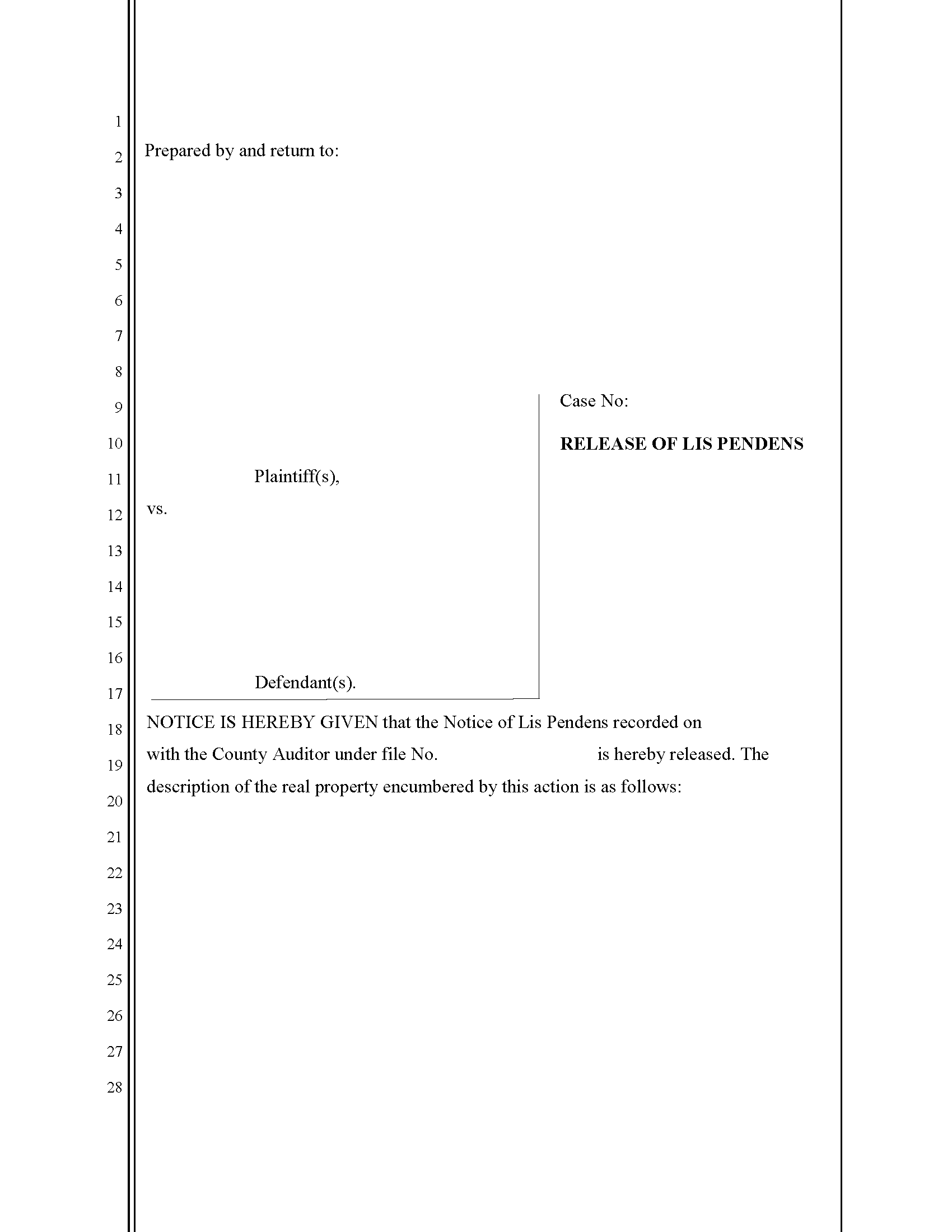
Use this form to release a previously recorded Lis Pendens. Formatted to accommodate multiple parties, common in a suit involving real property, Save (Fifty Dollars) that is charged for a document not meeting standard recording requirements. RCW 65.04.048
(Washington Release of LP Package includes form, guidelines, and completed example)... More Information about the Washington Release of Lis Pendens
Mechanics Lien Notice to Customer
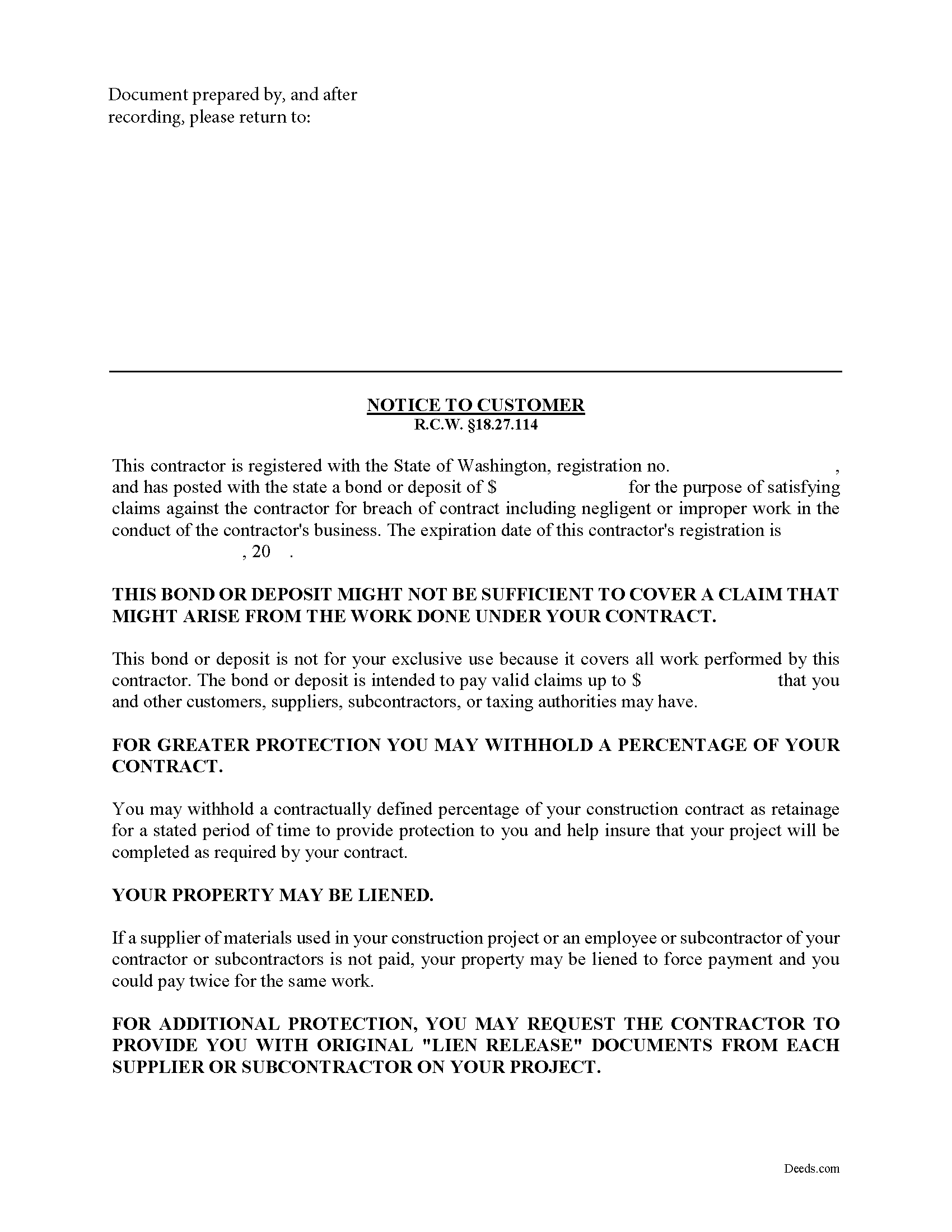
Notice to Customer -- When are disclosure statements needed?
Any contractor agreeing to perform any contracting project for the repair, alteration, or construction of four or fewer residential units (or accessory structures) on a residential property when the bid or contract price totals $1,000 or more must provide the customer with a disclosure statement. In addition, a disclosure statement must be provided when a contract agrees to perform the repair, alteration, or construction of a commercial building when the bid or contract price totals $1,000 or more but is less than $60,000. R.C.W. 18.27.114(1).
The notice is an important step in the mechanic's lien process because no contractor may bring or maintain any lien claim based on any contract without first alleging and proving that the contractor has provided the customer with a copy of the disclosure statement. R.C.W. 18.27.114(4).
The notice contains the following information for the customer's knowledge: (1) the contractor's registration number, (2) the bond or deposit amount posted with the state, (3) the expiration date of the contractor's registration, and (4) the amount up to which the bond is intended to pay any ... More Information about the Washington Mechanics Lien Notice to Customer
Notice of Right to Claim of Lien
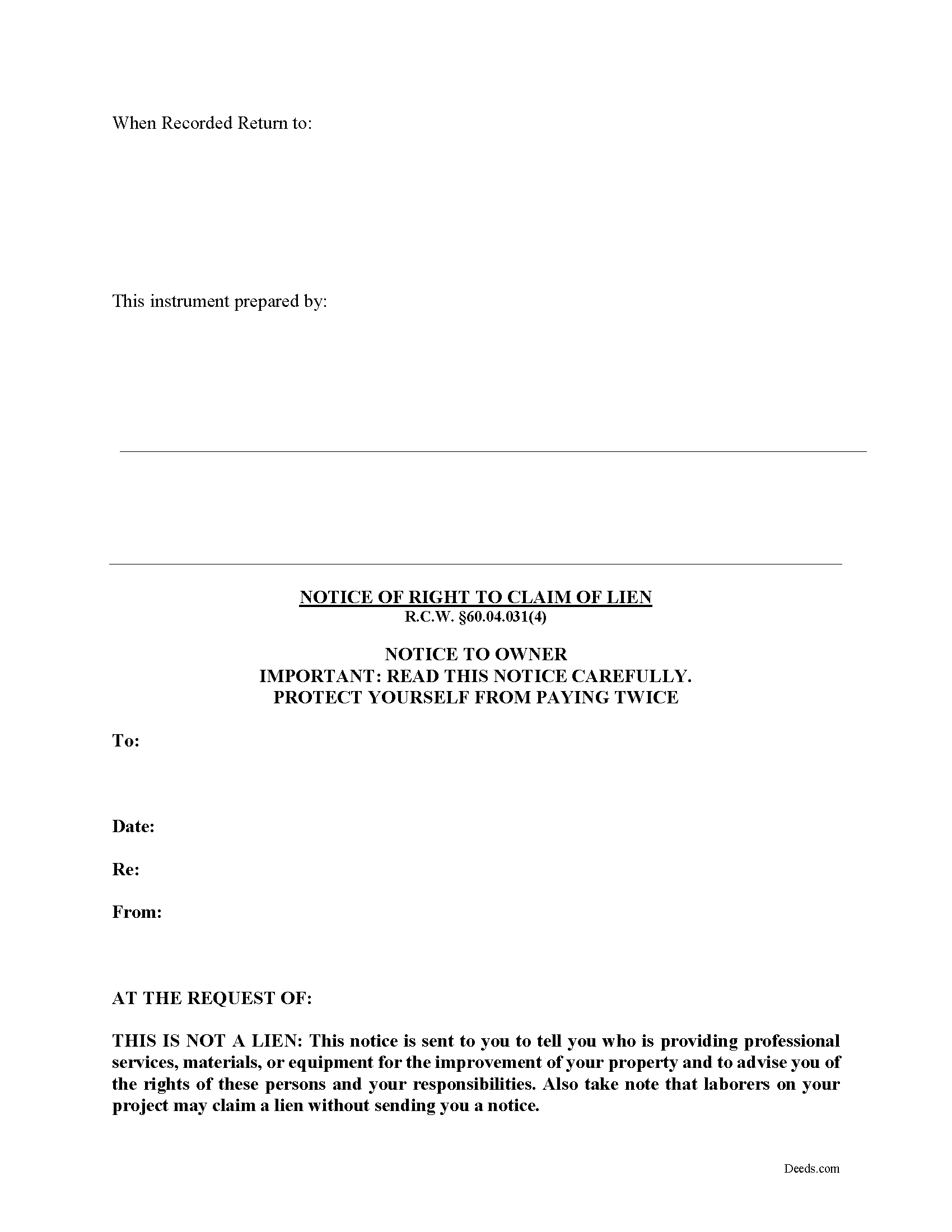
Mechanic's Lien Preliminary Notices in Washington
Most states require some form of preliminary notice to be served on a property owner as part of the mechanic's lien process. This lets the owner know who is working on the job and protect him or herself from "hidden liens." Therefore, contractors who anticipate needing to file liens should follow the proper procedure. The Notice of Right to Claim of Lien is the required form of preliminary notice used in Washington. R.C.W. 60.04.031.
Subject to a few exceptions, every person furnishing professional services, materials, or equipment used for the improvement of real property must give the owner (or reputed owner) notice in writing of the right to claim a lien. See R.C.W. 60.04.031(1). This notice shall also be given to the prime contractor unless the potential lien claimant has contracted directly with the prime contractor. Id.
The notice may be given at any time but only protects the right to claim a lien for professional services, materials, or equipment supplied after the date which is sixty (60) days before:
(a) Mailing the notice by certified or registered mail to the owner or reputed owner; or
(b) Delivering or s... More Information about the Washington Notice of Right to Claim of Lien
Mechanics Lien Notice of Furnishing
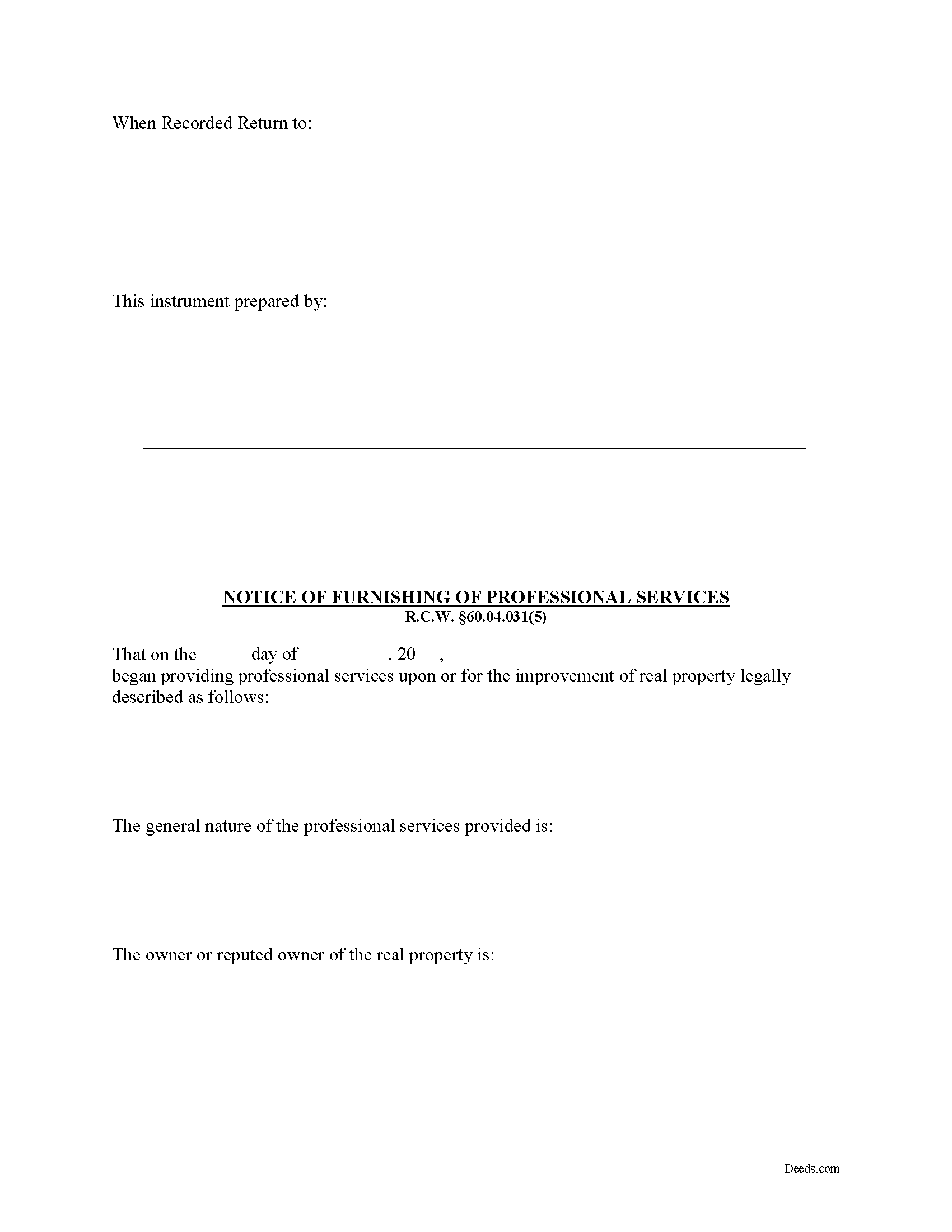
How to use a Notice of Furnishing in Washington
When it comes time to foreclose on a recorded lien, multiple parties are often fighting for a slice of the pie. Who gets what (or who gets anything at all) must be decided by the ancient rule of priority. Simply put, the rule states that the first in time is the first in right. But how can you ensure your claim is honored following a foreclosure suit? In Washington, claimants protect their interest by recording a notice of furnishing. This document ensures that their portion does not end up subordinate (inferior) to those of other claimants.
Although not explicitly required, every potential lien claimant providing professional services may, at their option, record the notice where no improvement has been commenced, and the professional services provided are not visible from an inspection of the real property. See R.C.W. 60.04.011. The notice must be recorded in the real property records of the county where the property is located. Id. The notice must contain the professional service provider's name, address, telephone number, a legal description of the property, the owner or reputed owner's name, and the general nature of the pr... More Information about the Washington Mechanics Lien Notice of Furnishing
Mechanics Lien Notice to Construction Lender
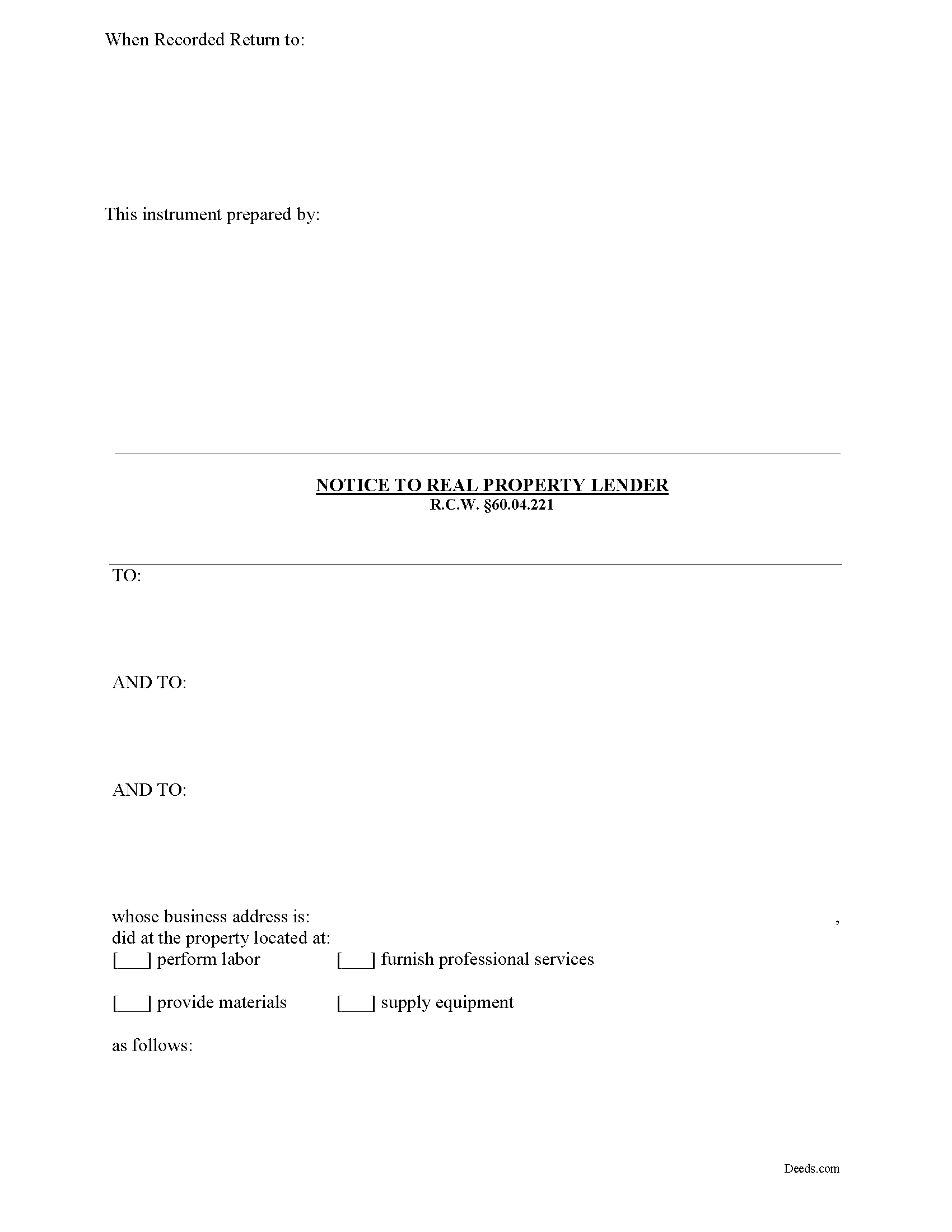
Getting a Construction Lender to Withhold Funds
As part of the construction lien process, you might find it useful to send a notice to the construction lender ordering the lender to withhold distribution of funds from the loan proceeds until you are paid. This is another potential weapon in the lien claimant's arsenal. In some states, this notice is called as a "stop notice" because it instructions the lender to stop payment. The notice can be used as a first step or as an alternative to securing a mechanic's lien.
Any potential lien claimant who has not received a payment within five days after the date required by their contract, invoice, employee benefit plan agreement, or purchase order may give a notice to a construction lender within thirty-five days of the date required for payment of the contract, invoice, employee benefit plan agreement, or purchase order. See R.C.W. 60.04.221(1).
The notice must be signed by the potential lien claimant or some person authorized to act on his or her behalf. R.C.W. 60.04.221(2). The notice must be provided in writing to the lender at the office administering the construction financing, along with a copy given to the owner and the ... More Information about the Washington Mechanics Lien Notice to Construction Lender
Notice of Claim of Mechanics Lien
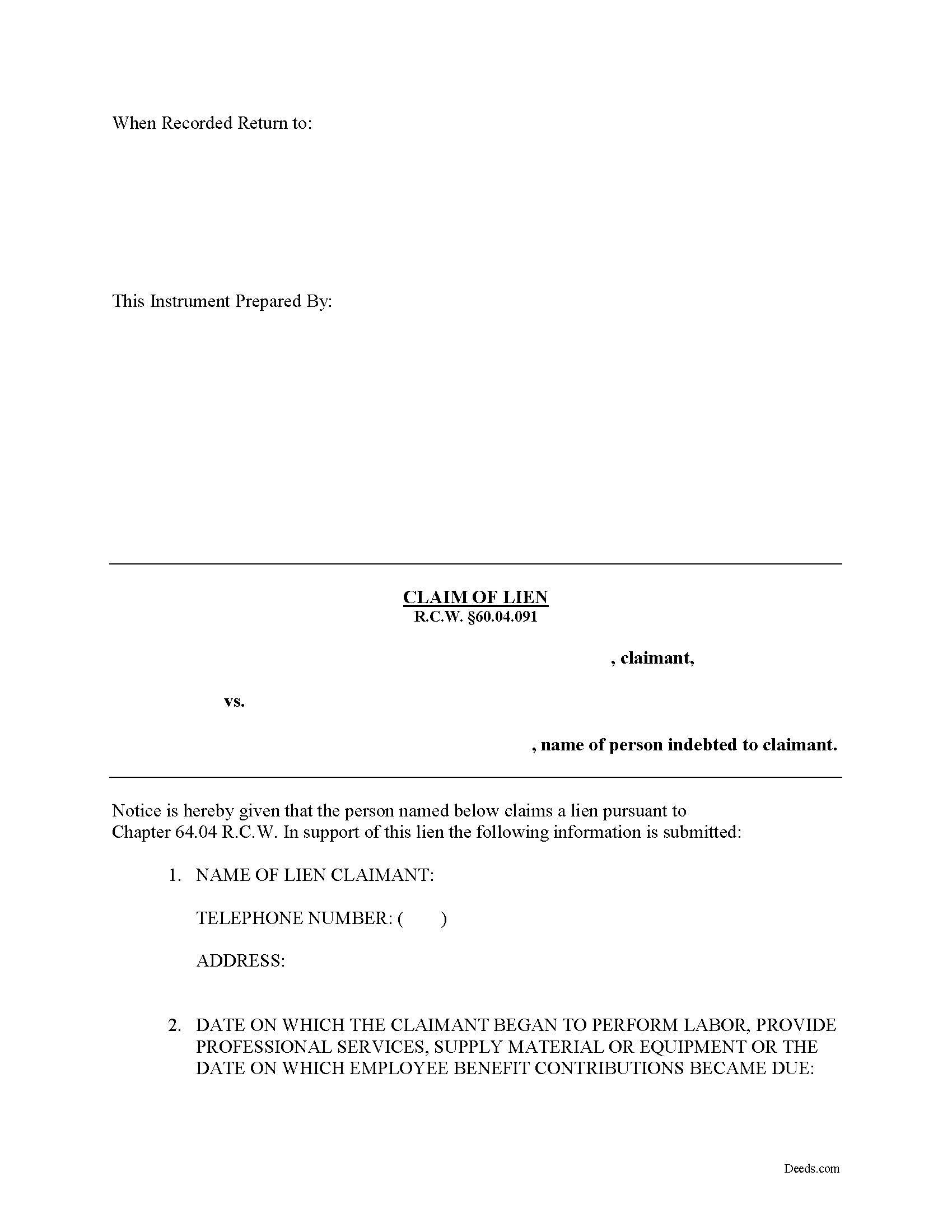
Obtaining a Mechanic's Lien in Washington
In Washington, any licensed contractor, subcontractor, or supplier who furnishes labor, professional services, materials, or equipment is entitled to claim a mechanic's lien. Every person claiming a lien must file and record a notice of claim of lien, in the county where the subject property is located, no later than ninety (90) days after the person has ceased to furnish labor, professional services, materials, or equipment or the last date on which employee benefit contributions were due. See R.C.W. 60.04.091.
The notice of claim of lien must contain the following information: (1) the name, phone number, and address of the claimant; (2) the first and last date on which the labor, professional services, materials, or equipment was furnished or employee benefit contributions were due; (3) the name of the person indebted to the claimant; (4) the street address, legal description, or other description reasonably calculated to identify, for a person familiar with the area, the location of the real property to be charged with the lien; (5) the name of the owner or reputed owner of the property, if known, and, if not known, that fact shall... More Information about the Washington Notice of Claim of Mechanics Lien
Conditional Waiver and Release of Claim upon Progress Payment
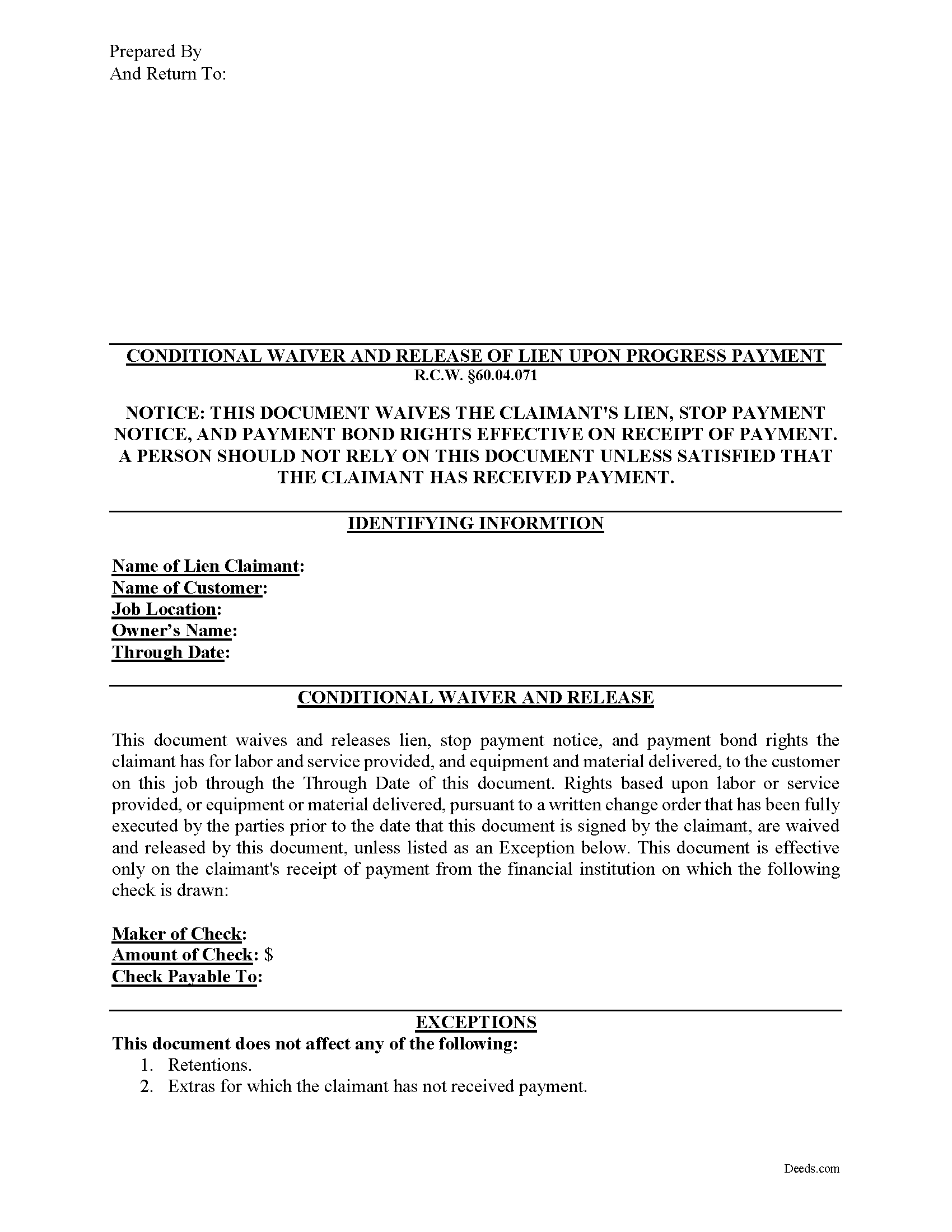
Contractors who have already recorded a lien against real property may use a conditional waiver and release of claim upon progress payment to surrender a portion of their reserved lien rights in exchange for, or to encourage, payment on a balance due.
Washington law requires a lien release upon payment and acceptance of the amount due to the lien claimant and upon the demand of the owner or the person making payment. R.C.W. 60.04.071. If a claimant fails to provide a waiver or release when one is due, the owner can pursue legal action to compel deliverance of the release and if the court determines the delay was unjustified, the court can, in addition to ordering the deliverance of the release, award the costs of the action including reasonable attorneys' fees and any damages. Id.
Given in exchange for full or partial payments, mechanic's lien waivers can be useful at various points during the construction/improvement process. Waivers can also lead to confusion, however, and issuing the wrong kind of waiver (or issuing one too early) can cause dire consequences for the mechanic's lien claimant. Washington's statutes do not provide for any required forms of lien waivers, but c... More Information about the Washington Conditional Waiver and Release of Claim upon Progress Payment
Unconditional Waiver and Release of Claim upon Progress Payment
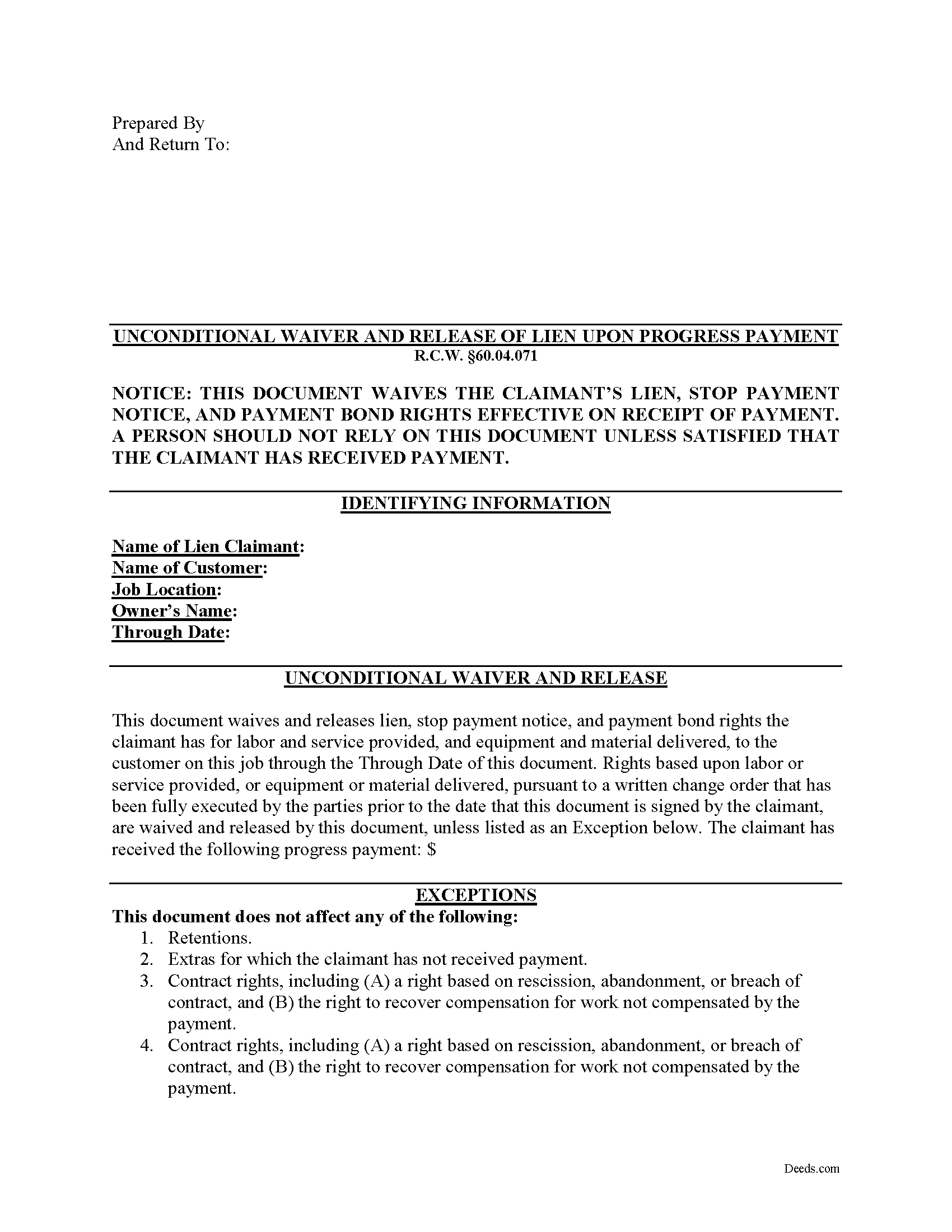
Contractors who have already recorded a lien against real property may use an unconditional waiver and release of claim upon progress payment to surrender their reserved lien rights in exchange for, or to encourage, payment on an outstanding balance.
Washington law requires a lien release upon payment and acceptance of the amount due to the lien claimant and upon the demand of the owner or the person making payment. R.C.W. 60.04.071. If a claimant fails to provide a waiver or release when one is due, the owner can pursue legal action to compel deliverance of the release and if the court determines the delay was unjustified, the court can, in addition to ordering the deliverance of the release, award the costs of the action including reasonable attorneys' fees and any damages. Id.
Given in exchange for full or partial payments, mechanic's lien waivers can be useful at various points during the construction/improvement process. Waivers can also lead to confusion, however, and issuing the wrong kind of waiver (or issuing one too early) can cause dire consequences for the mechanic's lien claimant. Washington's statutes do not provide for any required forms of lien waivers, but c... More Information about the Washington Unconditional Waiver and Release of Claim upon Progress Payment
Conditional Waiver and Release of Claim upon Final Payment
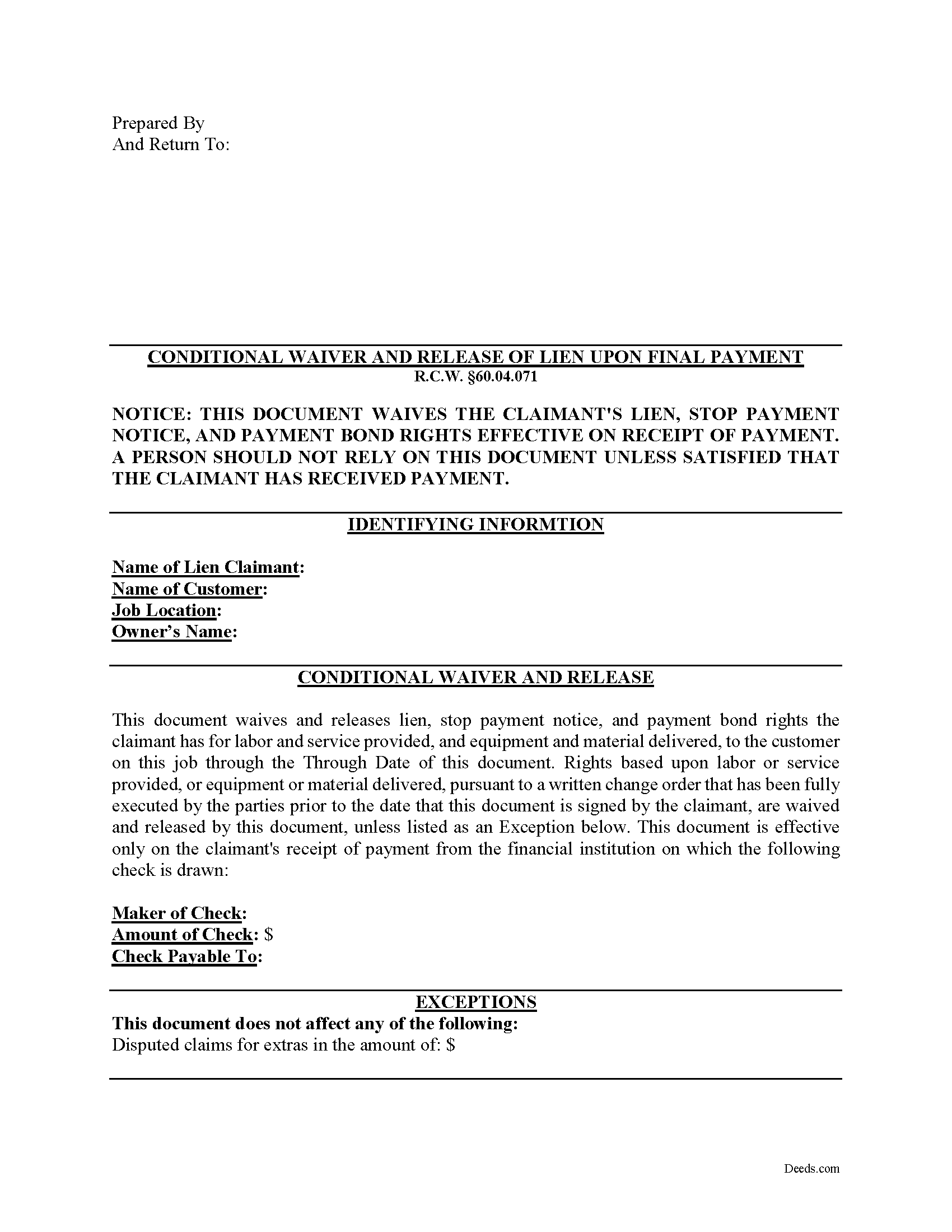
Contractors who have already recorded a lien against real property may use a conditional waiver and release of claim upon final payment to surrender their reserved lien rights in exchange for, or to encourage, payment on a balance due.
Washington law requires a lien release upon payment and acceptance of the amount due to the lien claimant and upon the demand of the owner or the person making payment. R.C.W. 60.04.071. If a claimant fails to provide a waiver or release when one is due, the owner can pursue legal action to compel deliverance of the release and if the court determines the delay was unjustified, the court can, in addition to ordering the deliverance of the release, award the costs of the action including reasonable attorneys' fees and any damages. Id.
Given in exchange for full or partial payments, mechanic's lien waivers can be useful at various points during the construction/improvement process. Waivers can also lead to confusion, however, and issuing the wrong kind of waiver (or issuing one too early) can cause dire consequences for the mechanic's lien claimant. Washington's statutes do not provide for any required forms of lien waivers, but contractors may i... More Information about the Washington Conditional Waiver and Release of Claim upon Final Payment
Unconditional Waiver and Release of Claim upon Final Payment
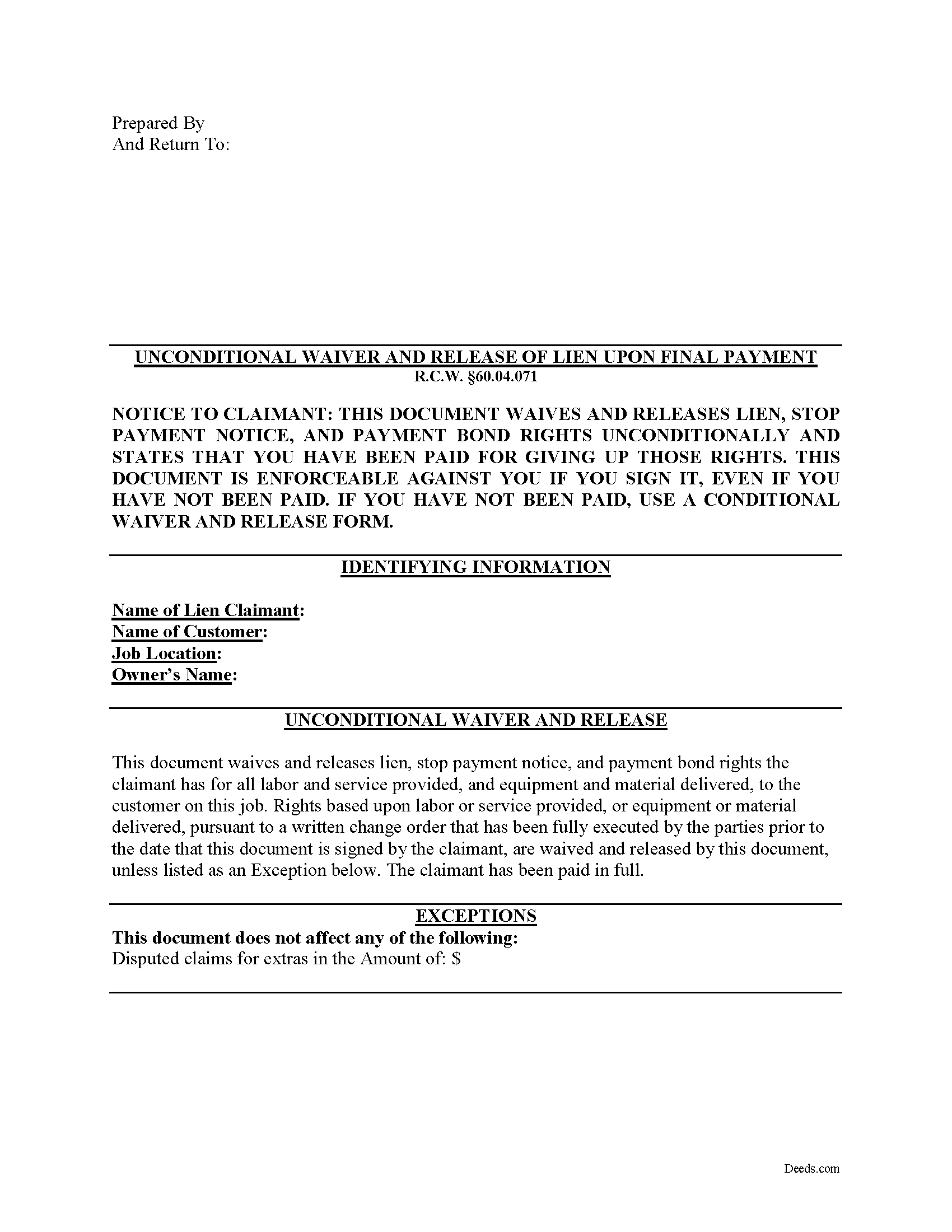
Contractors who have already recorded a lien against real property may use an unconditional waiver and release of claim upon final payment to surrender their reserved lien rights in exchange for, or to encourage, payment on a balance due.
Washington law requires a lien release upon payment and acceptance of the amount due to the lien claimant and upon the demand of the owner or the person making payment. R.C.W. 60.04.071. If a claimant fails to provide a waiver or release when one is due, the owner can pursue legal action to compel deliverance of the release and if the court determines the delay was unjustified, the court can, in addition to ordering the deliverance of the release, award the costs of the action including reasonable attorneys' fees and any damages. Id.
Given in exchange for full or partial payments, mechanic's lien waivers can be useful at various points during the construction/improvement process. Waivers can also lead to confusion, however, and issuing the wrong kind of waiver (or issuing one too early) can cause dire consequences for the mechanic's lien claimant. Washington's statutes do not provide for any required forms of lien waivers, but contractors ma... More Information about the Washington Unconditional Waiver and Release of Claim upon Final Payment